The Great Western Railway, and the communities around it, have been shaped by many inspirational individuals. Our new fleet of Intercity Express Trains celebrate these people and their legacies by bearing their names.
Each train will have its own identity, with their name accompanied by an individual coin specifically designed to reflect the person themselves. This is inspired by GWR’s heritage where the flagship locomotive King George V bore a set of commemorative coins.
The trains that we have already named are featured below, including biographical information on each person as well as pictures and videos from the ceremonies.
Named by HM Queen Elizabeth II, on the 13 June 2017, to mark 175 years since Queen Victoria became the first monarch to travel by train.
800003 was used to recreate the historic journey from Slough to London Paddington - with HM Queen Elizabeth II and the Duke of Edinburgh, Prince Phillip, on board.
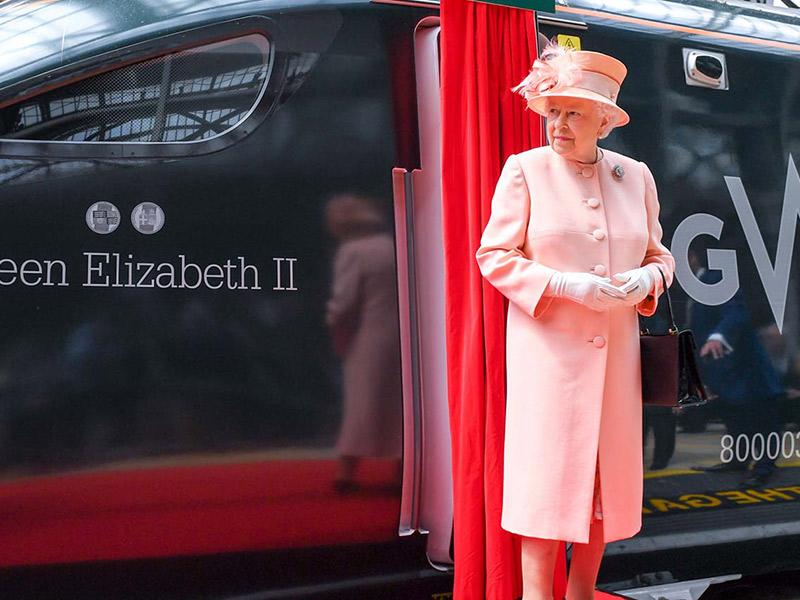 Pictured: HM Queen Elizabeth II names 800003 at London Paddington
Pictured: HM Queen Elizabeth II names 800003 at London Paddington
At London Paddington, with the statue of Brunel watching on, Her Majesty officially named the train Queen Elizabeth II / Queen Victoria.
The coins on the train carry the official flag of the Royal Family – the Royal Standard; which is used to indicate the presence of The Queen, with its first use in its current form in 1837.
With Windsor Castle so near, there’s always been a strong link between the Royal Family and the railway. So, it’s a fitting tribute for 800003 to bear the name of Her Majesty and Queen Victoria.
800004 was officially unveiled on 30 June 2016, with the names of Isambard Kingdom Brunel and Sir Daniel Gooch adorning the driving ends.
The occasion marked 175 years since the first train ran from Bristol to London.

Pictured: 800004 crosses Maidenhead Bridge on 30 June 2016
Isambard Kingdom Brunel
This revolutionary engineer designed and built the Great Western Railway – from bridges and viaducts, and the two-mile long Box Tunnel, to the famous Paddington, and Bristol Temple Meads stations.
His bridge designs – Maidenhead Railway Bridge, Clifton Suspension Bridge (Bristol), and Royal Albert Bridge (near Plymouth), are key engineering monuments that celebrate the South West.
Around the world, Isambard Kingdom Brunel is known as one of the greatest engineers ever. And, as founder of the GWR, he truly deserves his place on our first named Intercity Express Train.
Sir Daniel Gooch
The first Superintendent of Locomotive Engines from 1837 to 1864 - and Chairman of the Great Western Railway from 1865 to 1889.
Having worked at Robert Stephenson and Company, Gooch persuaded Brunel to buy two locomotives from them - North Star and Morning Star – that became the basis of the GWR Star Class.
In 1840, the GWR Firefly Class followed. And in 1846, he designed the first complete locomotive built at Swindon - the GWR Iron Duke Class, able to reach 70 miles an hour.
In our new Intercity Express Trains, the revolution he started continues to inspire today.
We marked the 75th anniversary of the NHS by naming 800005 after Aneurin Bevan, the minister for health responsible for its launch.
Aneira Thomas – the first baby born on the NHS – unveiled the train during a special ceremony at Newport on 4 July 2023.

Welsh Labour Party politician Aneurin Bevan was minister for health in Clement Attlee’s government and spearheaded the creation of the National Health Service.
Following a train-naming ceremony in his honour, the Aneurin Bevan train operated a service from Newport to London Paddington, calling at Swindon to acknowledge the role the town’s railway industry played in the formation of the NHS.
The Great Western Railway Medical Fund Society (MFS) was formed in 1847 with money raised by direct deductions from the wages of colleagues at the GWR works in Swindon.
Over the next 100 years the MFS developed a host of facilities – from washing baths to doctors and dental surgeries. Having visited the facilities in Swindon, it is reported that Bevan later remarked: “There it was, a complete health service. All we had to do was to expand it to embrace the whole country!”.
Aneira Thomas was born at one minute past midnight on 5 July 1948, making her the first NHS baby born and, to celebrate, her parents named her after the Welsh politician.
Aneira said: “This amazing train will forever be a reminder of the great man and the National Health Service that delivers with such skill, care and compassion. Happy 75th Birthday NHS, thank you GWR.”
- World War Two codebreaker Alan Turing was honoured during a ceremony at London Paddington on 26 May 2022.
Alan’s nieces Janet Robinson and Inagh Payne officially named 800008 in his honour. The ceremony also saw the unveiling of GWR’s new ‘Trainbow’ livery celebrating the LGBTQ+ community.
Alan Turing OBE
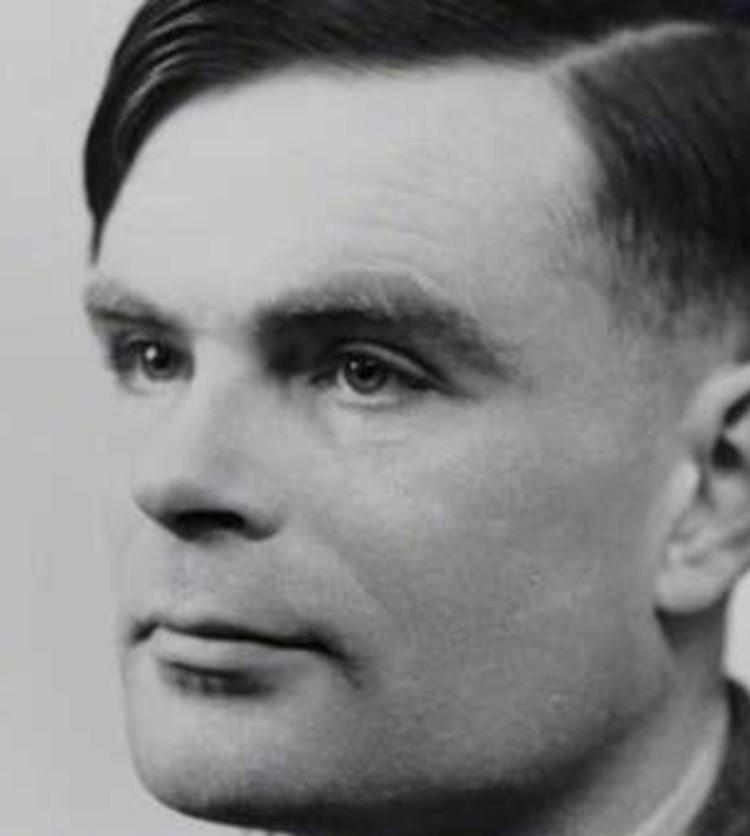
Alan famously led a team in ‘Hut 8’ at the Government Code and Cypher School (GC&CS) at Bletchley Park, Britain’s codebreaking centre during the war.
In 1942 he and his team cracked the vitally important and most difficult German Naval Enigma. His work in the field of computer science was groundbreaking and paved the way for modern computing.
Alan is also an admired role model within the LGBTQ+ community and his legacy has helped change social attitudes in Britain.
Although laws during the 1950s made it illegal for him to be openly gay, Alan did not shy away from his sexuality. He was arrested for gross indecency which resulted in a sentence of chemical castration.
2 years later Alan died of cyanide poisoning. Following the launch of an internet campaign in 2009, he was granted a posthumous royal pardon four years later. A subsequent legal amendment, known as ‘Turing’s Law’, pardoned 65,000 other convicted gay and bisexual men.
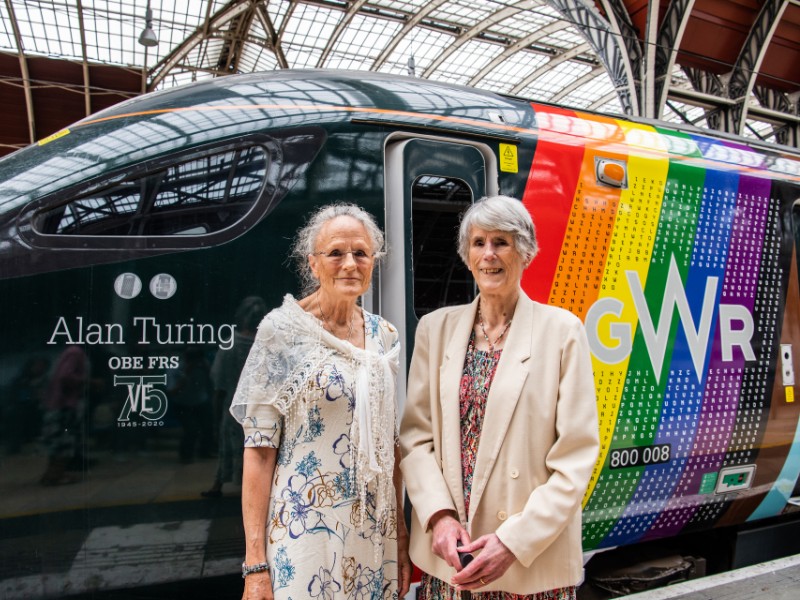
Inagh Payne, speaking on behalf of the family, said:
“Alan was very special to us and we are so incredibly proud of everything he did. Despite not being fond of neither fuss nor social occasions, he would have been delighted to have a train named after him.
“We have our own fond memories of him as a loving and caring uncle and it is wonderful to see this tribute to him, and that he is remembered, and his life celebrated by so many people.”
Trainbow
‘Trainbow’ was first unveiled in 2018 to support Pride events across the network and demonstrate GWR’s support for the LGBTQ+ community.
Its livery has now been updated to include black, brown, light blue, light pink and white, bringing focus on inclusion for trans individuals, marginalised people of colour and those living with HIV/AIDS.
Intercity Express Train 800008 also pays a nod to the World War Two codebreakers and their mastery of palindromes. And, as you might expect with something related to Alan Turing, there is more to the design of the new livery than first meets the eye.
- 800009 pays tribute to Welsh sport, having been named after Sir Gareth Edwards, and John Charles, on 7 March 2018 - when London celebrated Wales Week.
GWR is the proud custodian of the railway that links Cardiff with London, and it was across this.
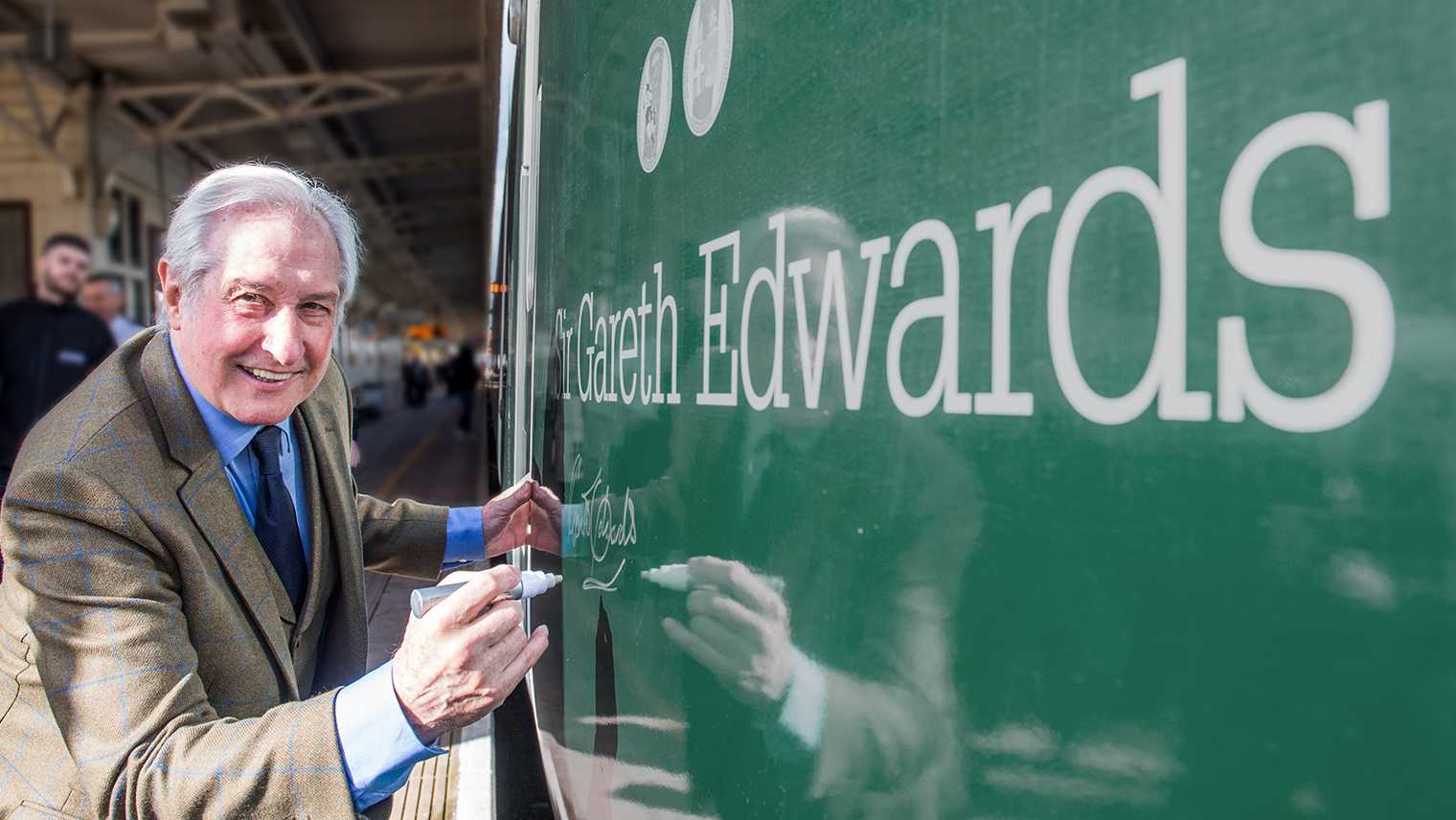
Pictured: Sir Gareth Edwards signs 800009 at Cardiff Central
Edwards, revered by many as the greatest rugby player of all time, signed the train at the Welsh capital’s station before travelling to London alongside John Charles’ widow, Glenda.
At Paddington, Juventus football club welcomed the train with kits from Charles playing days on show.
Sir Gareth Edwards
Edwards won his first cap for Wales in 1967 - at the age of 19. The following year, he became the youngest player to captain the side.
He was ever-present in a Welsh team, that dominated the Five Nations Championship - winning the title seven times, including three grand slams.
He appeared 10 times for the British and Irish Lions – playing in the 1971 team, that were the only side to win a series in New Zealand, and in the 1974 team that went unbeaten in South Africa.
He was knighted in The Queen's Birthday Honours 2015 for services to sport, and for charitable services.
John Charles
Rated by many as the greatest British all-round footballer, Charles played at Leeds United for eight years. Scoring a total 150 league goals, he set a season record in 1956-57 – and remains their second highest all-time goal scorer.
In 1957 he joined Juventus, scoring 108 goals in 155 matches, winning the scudetto three times, and the Italian Cup twice. He also came third in the Ballon d'Or (world player award) in 1959. Nicknamed ‘Il Gigante Buono’ (The Gentle Giant), he was never cautioned or sent off.
In 1997, Charles was voted by Juventus fans as the club’s best-ever foreign player.
He played 38 times for Wales, scored 15 times, and helped them reach the quarter finals of the 1958 World Cup – the only time the country qualified.
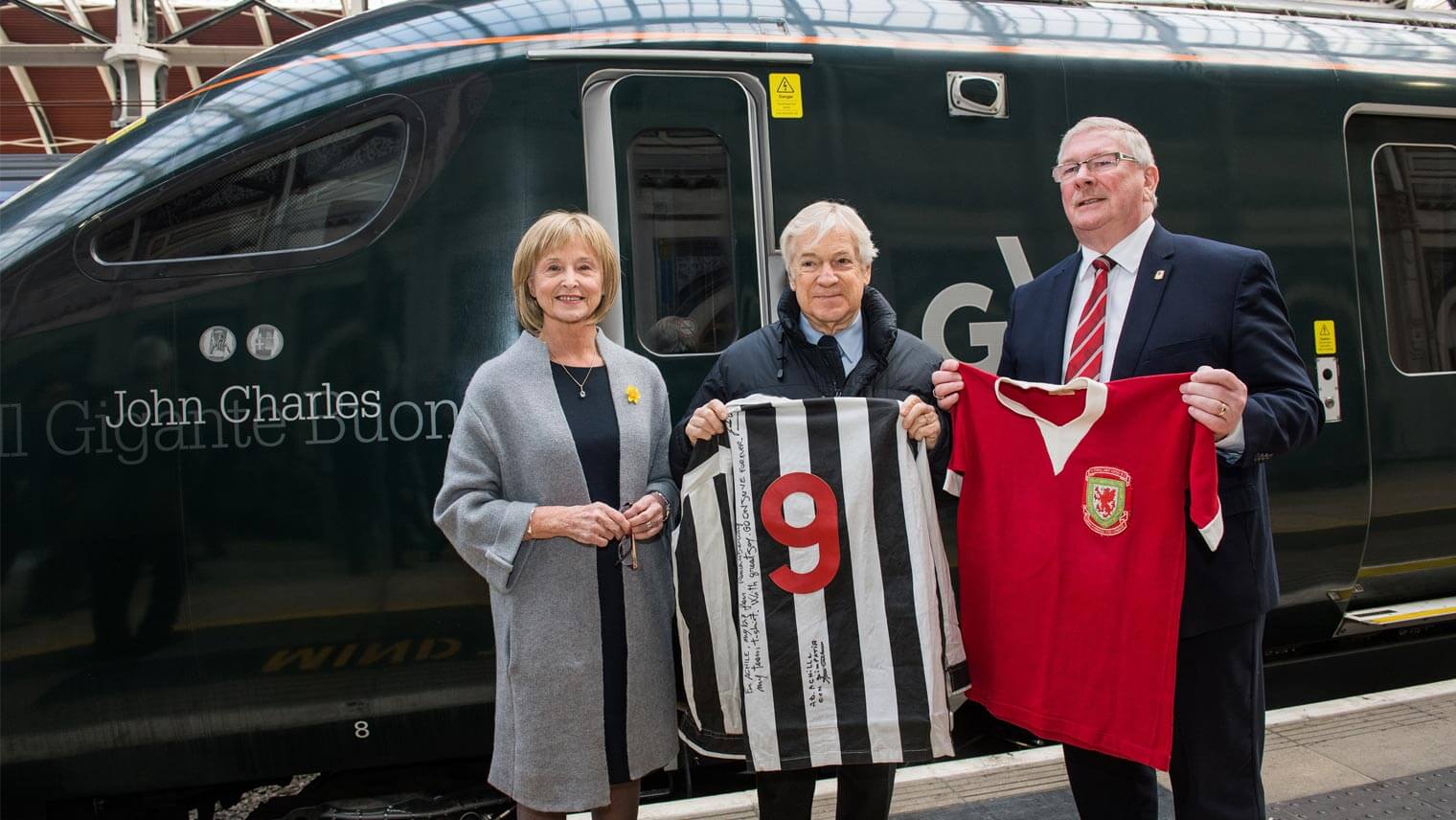 Pictured from left to right: Glenda Charles, Paolo Garimberti (President of Juventus Museum) and David Griffiths (President of Football Association of Wales)
Pictured from left to right: Glenda Charles, Paolo Garimberti (President of Juventus Museum) and David Griffiths (President of Football Association of Wales)
On 10 January 2018, 60 years of Paddington Bear were celebrated as Michael’s daughter, Karen Jankel, unveiled the names.
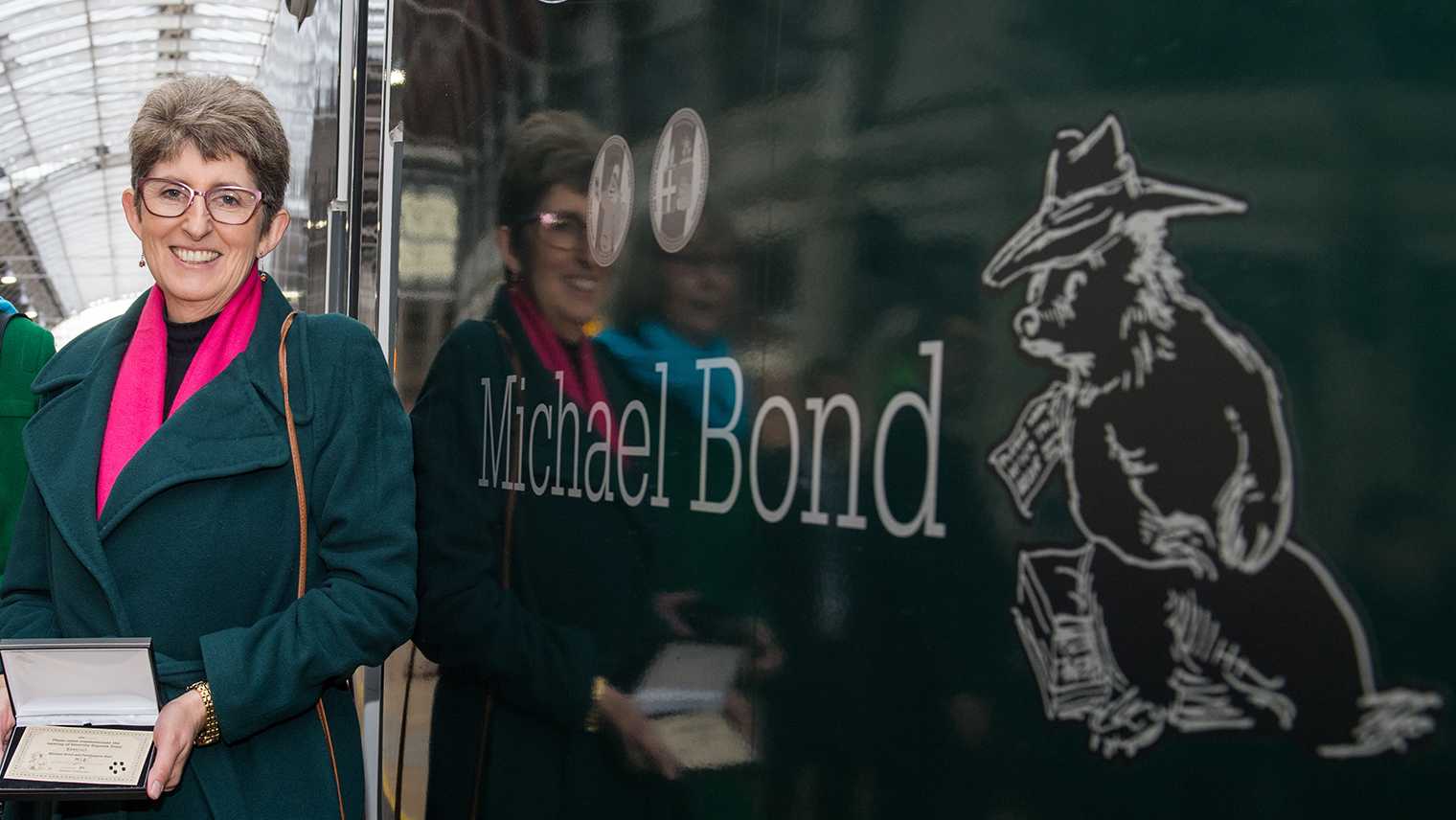 Pictured: Karen Jankel, Michael Bond’s daughter, alongside 800010
Pictured: Karen Jankel, Michael Bond’s daughter, alongside 800010
The doors were decorated with pictures of Paddington Bear from the original Peggy Fortum illustrations, and images from Paddington 2 the movie.
Michael Bond
Thomas Michael Bond grew up in Reading, where he developed a love for the old Great Western Railway locomotives that passed through the town. While working for the BBC, he published his first book, ‘A Bear Called Paddington’, in 1958.
The world-renowned character was based on a lone teddy bear on a shelf, in a shop near London Paddington Station on Christmas Eve 1956. Since then, more than 35 million Paddington books have been sold worldwide.
Paddington Bear
Paddington Bear, from ‘deepest, darkest Peru’, was sent to the United Kingdom by his Aunt Lucy. In the first book, the Brown family find him alone at Paddington Station, sitting on his suitcase, with a note that reads ‘Please look after this bear. Thank you.
Taking him back to their home at 32 Windsor Gardens, near Notting Hill, they name him Paddington.
Even though he’s polite and kind-hearted, Paddington’s adventures always end up getting him into trouble!
- Two influential female Great Westerners who furthered the role of women in society were celebrated on 8 March 2019.
International Women’s Day was marked with the naming of a train after Megan Lloyd George, the first female MP for Wales, and Edith New, a leading suffragette.
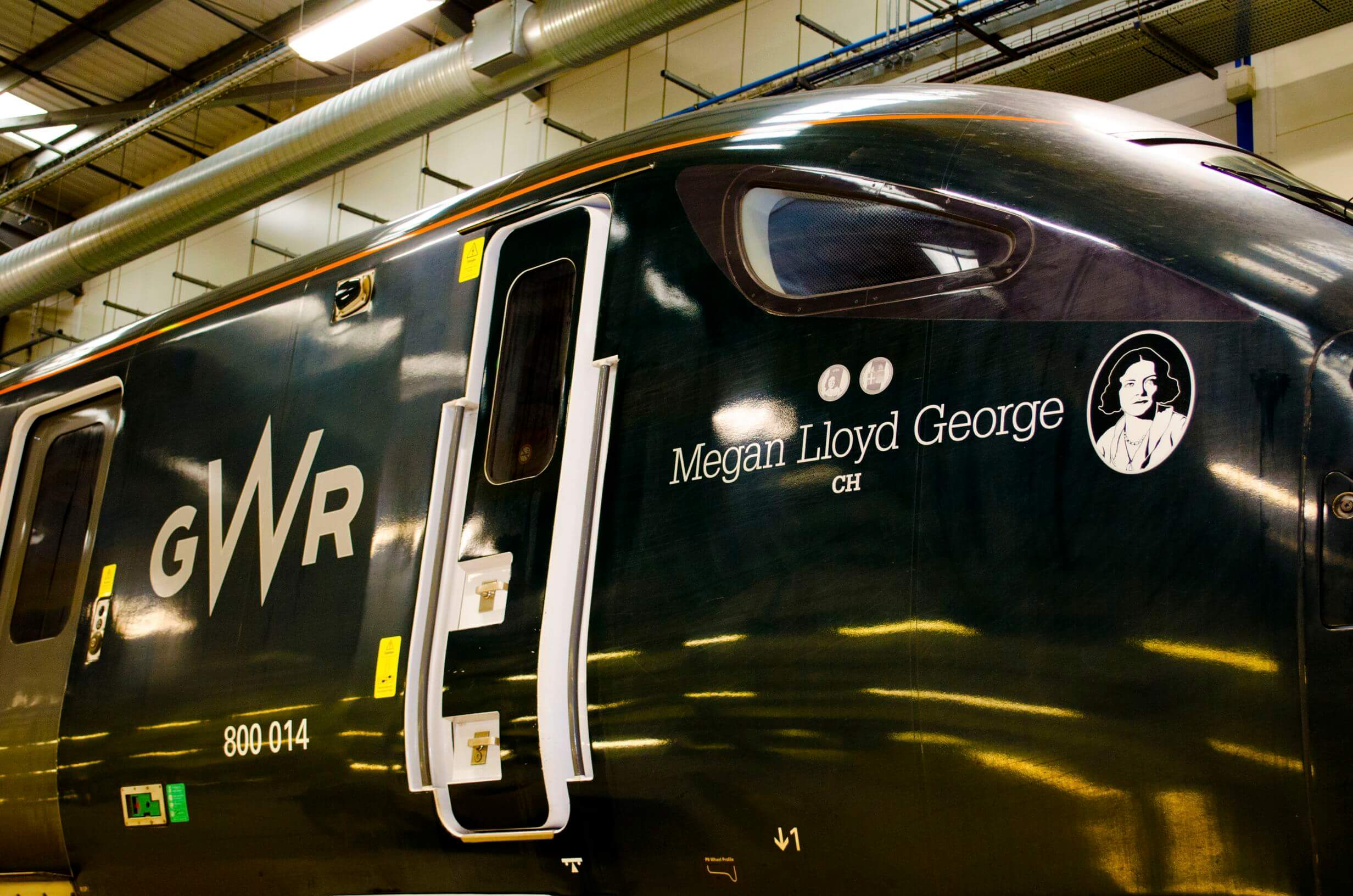 Pictured: 800014 Megan Lloyd George train naming.
Pictured: 800014 Megan Lloyd George train naming.
Megan Lloyd George
Daughter of former Prime Minister David Lloyd George, Megan was the first woman to be elected an MP from a Welsh constituency when she won the seat of Anglesey for the Liberals on 30 May 1929.
Throughout the 1940s and 1950s she campaigned for a Welsh Parliament and the creation of a Secretary of State for Wales.
She was elected Deputy Leader of the Liberal Party in 1949 but stood down three years later after losing her seat.
Megan defected to Labour and won a by-election in Carmarthen in 1957, holding the seat until her death from breast cancer on 4 May 1966, aged 64.
With over 37 years’ public service, her dedication saw her become the longest-serving woman MP of the 20th Century.
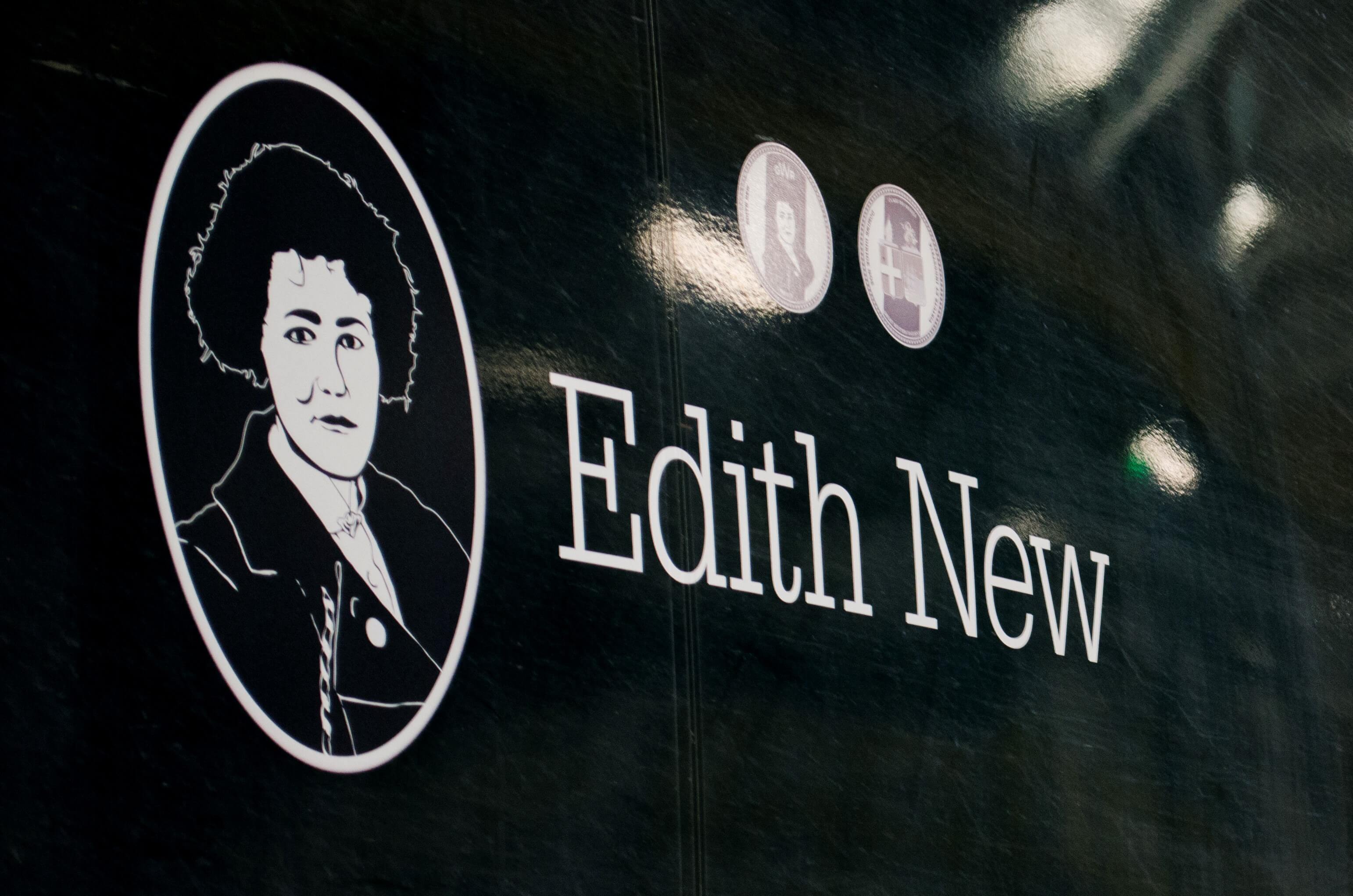 Pictured: Edith New train naming.
Pictured: Edith New train naming.
Edith New
Born in Swindon, Edith was a leading member of Emmeline Pankhurst’s Women’s Social and Political Union movement.
She was one of the first suffragettes to use vandalism as a tactic for getting voices heard in the campaign for women’s right to vote. During a protest in June 1908, Edith and another suffragette, Mary Leigh, broke two windows at 10 Downing Street.
They were arrested and sentenced to two months in Holloway Prison. Upon their release a parade was held in their honour by a delegation of suffragettes including Christabel Pankhurst.
Edith left the suffragettes in 1911 to resume her career in teaching and in later life retired to Polperro in Cornwall. She died on 2 January 1951, aged 73.
On the 22 June 2018, GWR celebrated 100 years of the RAF and marked 75 years since the historic Dambusters raid in WW2 by naming 800019 after pilots George ‘Johnny’ Johnson and Joy Lofthouse.
Johnny unveiled the names on the train at a ceremony held on Platform 3 at Bristol Temple Meads station.
George ‘Johnny’ Johnson
George ‘Johnny’ Johnson is the last surviving British member of the Dambusters raid. He was just 22 when he participated in the famous offensive that saw 19 Lancaster bombers drop specially-designed bouncing bombs on dams in the Ruhr Valley in Germany.
Johnson, who now lives in Bristol, served as a bomb aimer whose duty was to release the four-tonne explosives, which he said looked like ‘glorified dustbins’.
After the war, Johnson became a teacher and taught people with learning difficulties. He has helped raise money for charity and was presented with an MBE for services to World War Two in 2017.
 Pictured: George Johnny Johnson in front of 800019
Pictured: George Johnny Johnson in front of 800019 Joy Lofthouse
Born in Cirencester, Gloucestershire, Joy Lofthouse was a 20-year-old bank cashier when she replied to an advertisement to join the Air Transport Auxiliary (ATA). She became one of 164 female pilots who, during the second world war, transported military planes around the country.
Throughout her time with the ATA, Lofthouse flew 18 types of aircraft, including 400mph-fighters, all of which she navigated using maps and landmarks she could see from the cockpit.
In 2008, Lofthouse received a commemorative badge for her work with the ATA, issued by the government. She was also a patron of the charity Fly2Help, which encourages flying among young people.
Unveiled at Bristol Temple Meads on Wednesday 18 April, Bob Woodward – along with family, and Elizabeth’s former colleagues from Bristol City Archives were present as 800020 was named before their eyes.
Rightly featured in our 100 Great Westerners, these two Bristol heroes – Bob celebrated for his amazing charity work and Elizabeth remembered as a formidable public servant for the region, are now icons in our Intercity Express Train fleet.
Bob Woodward OBE
In 1974 Bob Woodward was a successful property developer when his eight-year-old son Robert was diagnosed with cancer.
Seeing what few resources were in place for children and their parents at the time, Woodward created a setting where families could be together while their child was treated.
Woodward went on to found charity CLIC (Cancer and Leukaemia in Childhood) in 1976, which later merged with Sargent Cancer Care for Children to form CLIC Sargent.
Woodward was also chief executive to The Starfish Trust, for which he still fundraises despite retiring in 2013.
In 2011, he was given a Lifetime Achievement award for his charitable work at the Pride of Britain Awards and received an OBE in 2014.
Elizabeth Ralph
Elizabeth Ralph (1911 - 2000) became archives clerk to Bristol City Council in 1937, rising to city archivist two years later. She remained in this post for more than three decades and was praised for her organisation and securing significant collections relating to the city’s history.
Ralph helped protect the archives during the Bristol Blitz of the Second World War.
Her public offices included first female chairman of the Council of the Society of Archivists and general secretary of the Bristol and Gloucestershire Archaeological Society, a post she held for 38 years before becoming president.
She also wrote several works on the archives and history of the city.
To mark International Women’s Day in 2017, the Bristol Post named Ralph among the city’s top 100 women.
A special ‘Great Westerners’ ceremony at Swansea station paid tribute to Gill Clay’s lifetime of dedication to Scouting and also celebrated 100 years of Scouting in Wales.
Gill, 87, granddaughter of Scouts founder Robert Baden-Powell, was joined by Scouts from across the Vale of Glamorgan on 21 February 2025 as 800021 was named in her honour.
Gill Clay
In 2024, Gill, a Beaver leader in Cowbridge, became the 399th person to receive the Bronze Wolf Award, Scouting’s highest honour.
It recognises the outstanding service, commitment and contributions of volunteers to the Scout Movement and is the only award presented by the World Scout Committee.
She said: “Having a train named after me and ScoutsCymru is an enormous honour. My family started Scouts in 1907 and the skills shared with young people have stood the test of time and continue to stand them in good stead for their lives, their challenges and the choices they make for wonderful futures.
“Being one of the Great Westerners named on the GWR fleet is a privilege that I am grateful for and feel very proud about.”
.jpg?h=600&w=900&hash=675A06426AB426E094695B1A540A5ED9)
Tulbahadur Pun VC, one of only 13 Gurkha soldiers to have received the Victoria Cross, was honoured during a ceremony at Paddington station on 23 June 2021.
Tulbahadur Pun VC
Pun’s son Arjun and daughter Megh Kumari were joined by guests including actress Joanna Lumley OBE, whose father Major James Rutherford Lumley was Pun’s Commanding Officer during the Second World War.
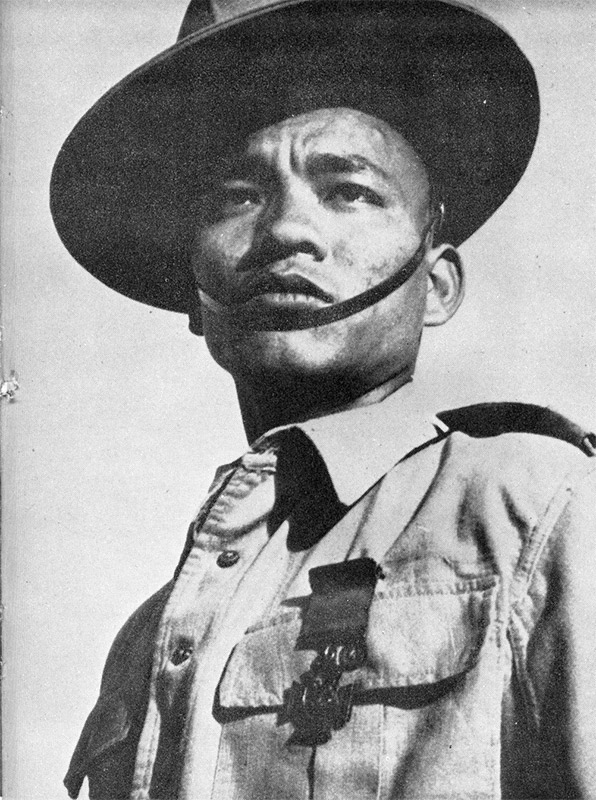
Tulbahadur Pun VC, who received the Victoria Cross.
Pun was aged just 21 and serving as a Rifleman in the 3rd Battalion of the 6th Gurkha Rifles when his heroic deed at Mogaung, Burma, led to him receiving the highest honour for gallantry awarded to British and Commonwealth forces.
Having seen several members of his platoon killed during an attack on a railway bridge on June 23, 1944, Pun continued the charge alone, killing three enemy soldiers and forcing five more to flee.
He then gave accurate supporting fire, enabling the rest of his platoon to reach the bridge. Later rising to the rank of Honorary Lieutenant, Pun was awarded 10 other medals including the Burma Star. He passed away in 2011.
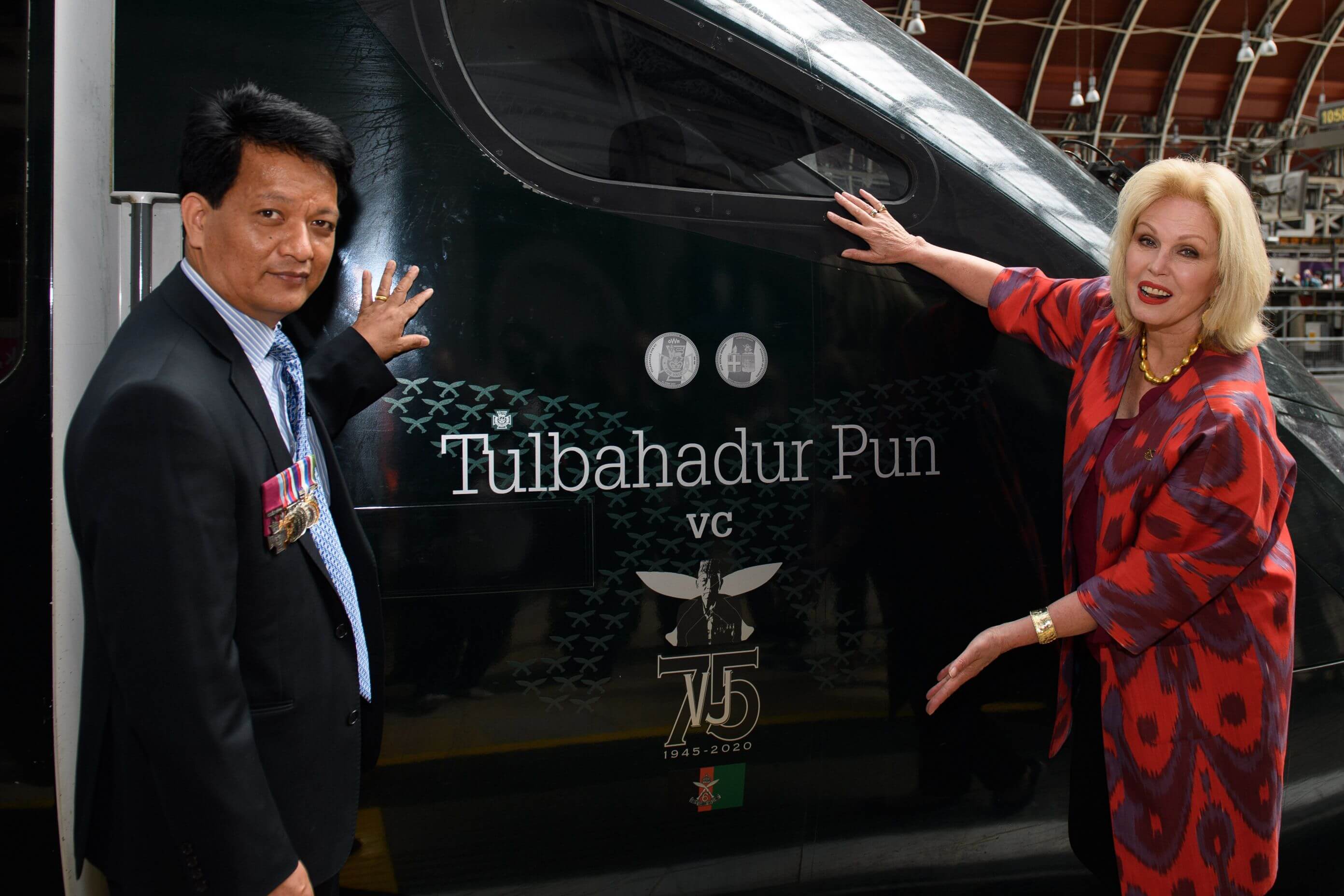 The train naming ceremony at Paddington station on 23 June 2021.
The train naming ceremony at Paddington station on 23 June 2021.
Joanna Lumley, who is Vice President of The Gurkha Welfare Trust, was joined at the ceremony by members of the Gurkha Brigade Association and 6thGurkha Rifles Regimental Association.
Absolutely Fabulous star Lumley said:
“This is an extraordinarily graceful gesture from Great Western Railway. I think it’s quite wonderful because Tulbahadur Pun’s name has gone down in history already, but this train means he will be remembered every day. I wish he was here to see it – he was such a modest man but I think this would have amused him and made him so proud.”
- 800023 pays tribute to Bristol paramedic Kathryn Osmond, who fought tirelessly to raise awareness of the skin cancer melanoma, and Fleur Lombard, the first female firefighter to die on duty in peacetime Britain.
Both were nominated as part of Great Western Railway’s 100 Great Westerners, with their names adorning either driving ends of the train.
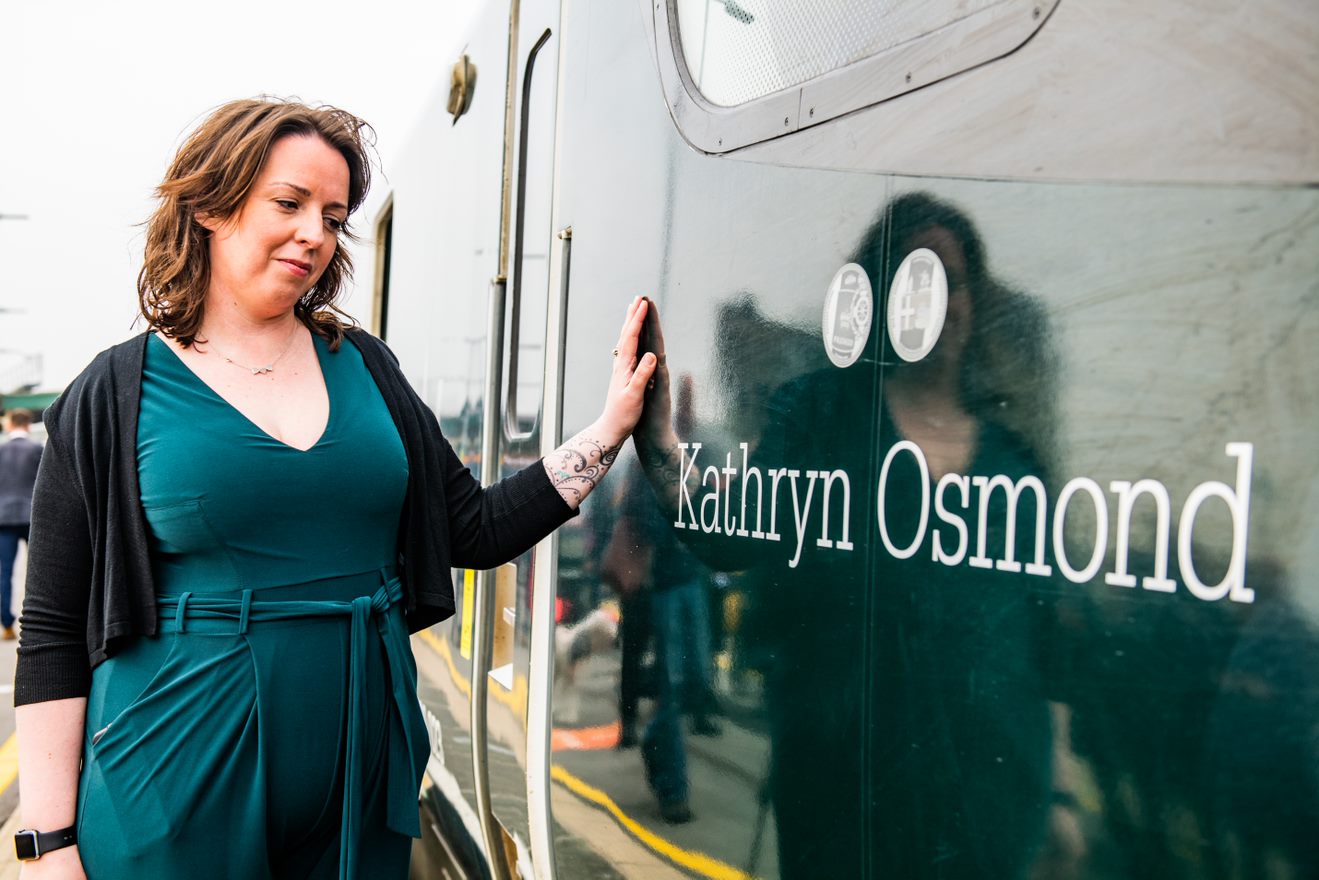 Pictured: Kathryn Osmond train naming ceremony at Bristol Temple Meads.
Pictured: Kathryn Osmond train naming ceremony at Bristol Temple Meads.
Kathryn Osmond
Kathryn worked as a paramedic for the South Western Ambulance Service NHS Foundation (SWAST) for 16 years. After a battle with melanoma she passed away on 18 April 2017 – the date of her 41st birthday.
The train naming ceremony took place at Bristol Temple Meads exactly two years to the day – on 18 April 2019 – in front of members of Kathryn’s immediate family, friends and a large contingent of SWAST colleagues.
While coping with her illness Kathryn fought tirelessly to raise awareness of melanoma and to find the “magic bullet” to beat it.
Alongside colleagues, she helped to raise tens of thousands of pounds over the course of a year through various challenges. One of the most memorable was when dozens of her colleagues took to the Clifton Suspension Bridge to do the Running Man Challenge.
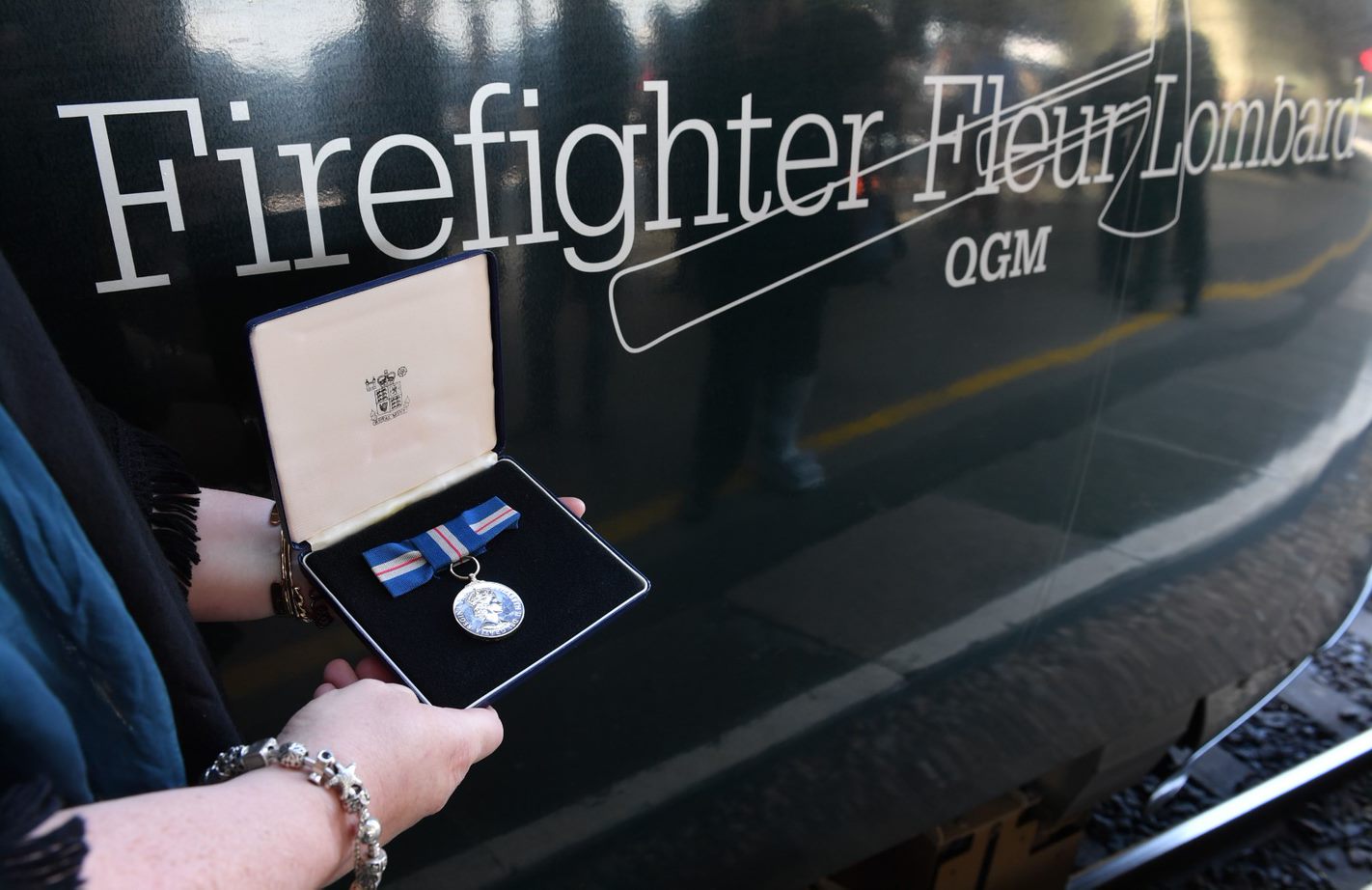 Pictured: Fleur Lombard train naming ceremony at Bristol Temple Meads.
Pictured: Fleur Lombard train naming ceremony at Bristol Temple Meads.
Fleur Lombard
One of only eight women among Avon’s 700 firefighters at that time, 21-year-old Fleur Lombard died on 4 February 1996 fighting a blaze started by an arsonist at Leo’s Supermarket, Bristol.
Together with firefighter Robert Seaman, Fleur entered the building to search for missing persons and to help contain the fire. Shortly after entering conditions deteriorated and the firefighters were ordered to evacuate. It was at this point Fleur was tragically caught in a flashover and was killed by the intense heat.
This tragedy led to major design changes in the safety equipment worn by both male and female fire fighters and has helped save many lives since.
The naming ceremony took place in front of members of family, friends and fire service colleagues at Bristol Temple Meads on 14 May 2019.
Fleur was nominated by Kerry McCarthy MP, the Bristol East MP who said:
“I am really pleased that GWR is paying this tribute to the bravery of Fleur Lombard, who tragically lost her life in the line of duty. Public service often goes unrecognised, and Fleur made the ultimate sacrifice, while doing her job. This will help ensure that her bravery is not forgotten.”
From Derbyshire, Fleur moved to Bristol to begin training as a full-time firefighter, having served as a retained firefighter. On graduating in 1994 she received the Silver Axe Award for the most outstanding recruit in her training school; and was posthumously awarded the Queens Gallantry Medal and the Chief Fire Officer’s Commendation in recognition of her bravery.
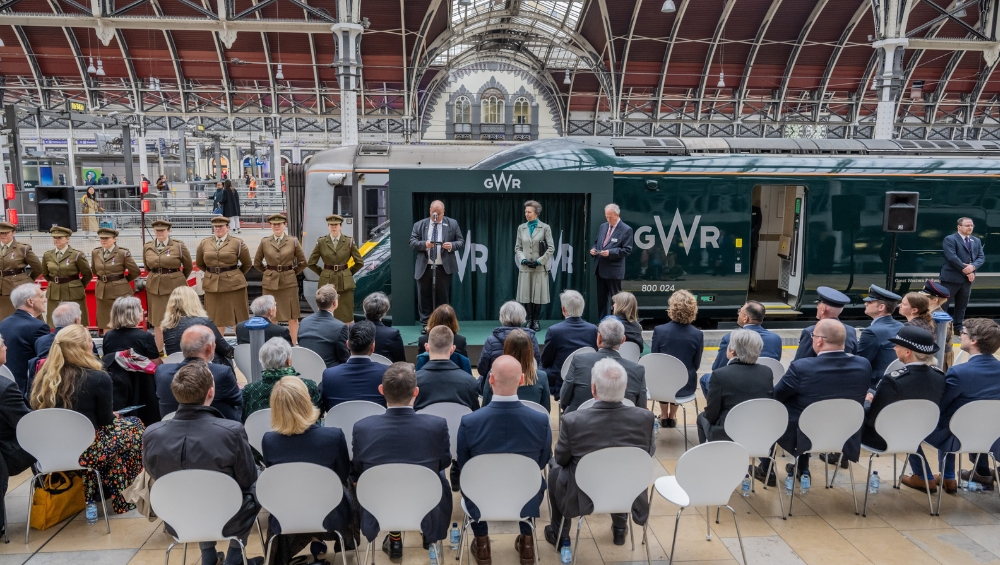
800024 was named after HRH The Princess Royal in recognition of her support for more than 300 charities, organisations and military regiments in the UK and overseas.
Representatives from a host of those organisations joined guests for a naming ceremony at London Paddington on 2 May 2024.
HRH The Princess Royal
Her Royal Highness was joined at Paddington by husband Vice Admiral Sir Tim Laurence, a member of the GWR Advisory Board.
After the unveiling, The Princess Royal was introduced to guests including the Secretary of State for Transport, Mark Harper MP, former Prime Minister Theresa May and Transport for London Commissioner Andrew Lord.
Mr Harper said: "Her Royal Highness has made a significant contribution to so many important charities, events and public services so it gives me great pride to celebrate this through one of the greatest traditions on our railways."
Inspired by the heritage of GWR’s King George V locomotive, two sides of a coin appear on the side of our named Intercity Express Trains.
With the Coat of Arms of the GWR on one side of coin, the other includes an illustration of The Princess competing at the 1976 Montreal Olympics. Seated on the Queen’s horse, Goodwill, Her Royal Highness was taking part in the equestrian three-day event – the first member of the Royal Family to feature in the Olympics.
800025 pays tribute to Captain Sir Tom Moore and his remarkable fundraising achievements during the Covid-19 crisis.
It was named in response to requests from both GWR colleagues and members of the public, re-entering service on Thursday 30 April 2020 – the date of Captain Sir Tom’s 100th birthday.
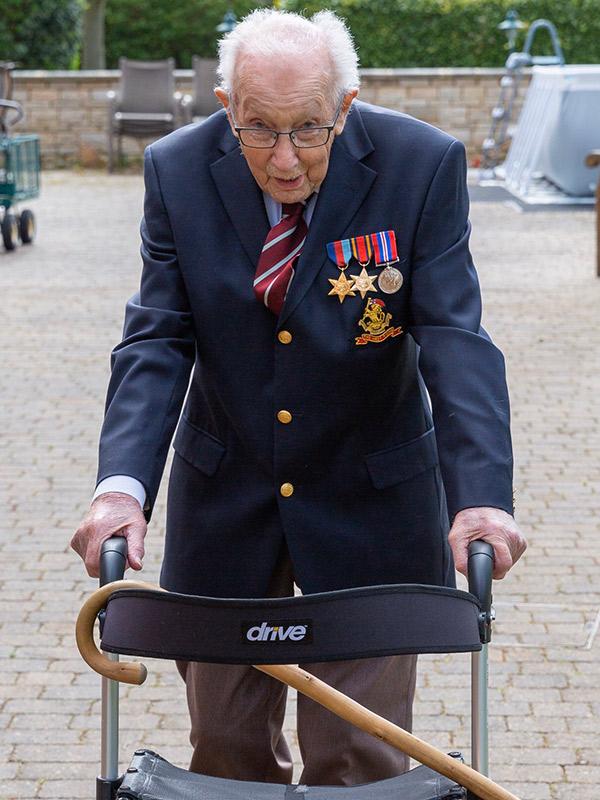 Pictured: Captain Sir Tom Moore completing laps in his garden
Pictured: Captain Sir Tom Moore completing laps in his garden
Captain Sir Tom captured the hearts of the nation during the Covid-19 crisis, raising more than £30 million for NHS Charities Together.
The Second World War veteran originally hoped to raise £1,000 before his 100th birthday, but his pledge to walk 100 laps of his garden went viral and more than one million people donated to his JustGiving page.
Captain Sir Tom’s fundraising feat was further boosted when his duet of You’ll Never Walk Alone, with musicals legend Michael Ball, reached No1.
Originally from Keighley in West Yorkshire, Captain Sir Tom joined the British Army in June 1940. His regiment – the 8th Battalion, the Duke of Wellington’s Regiment – trained in Wadebridge, Cornwall, tasked with coastal defence against a threatened German invasion. He later served on the frontline in Burma.
Captain Sir Tom completed 100 laps of the 25-metre (82ft) loop of his garden in Marston Moretaine, Bedfordshire, before his birthday on 30 April, leading to praise from the Royal Family, Prime Minister Boris Johnson and other famous faces, as well as calls for him to be given a knighthood.800025 was updated to include ‘Sir’ following Captain Tom’s knighthood on 17 July 2020. He passed away on 2 February 2021, aged 100.

- Bristol International Fiesta Founder Don Cameron MBE joined us on Platform 13 at Bristol Temple Meads to celebrate 40 years of the world-renowned festival – he even brought a balloon basket along with him.
Glasgow-born balloonist Don Cameron moved to Bristol in the 1960s. He helped design Britain’s first modern hot-air balloon, Bristol Belle, which took its premier flight in 1967.
After leaving his job as an aeronautical engineer, Cameron made a career of building and designing hot-air balloons, forming Cameron Balloons of Bristol in 1971 – now the world’s largest hot-air balloon manufacturer, producing up to 200 a year.
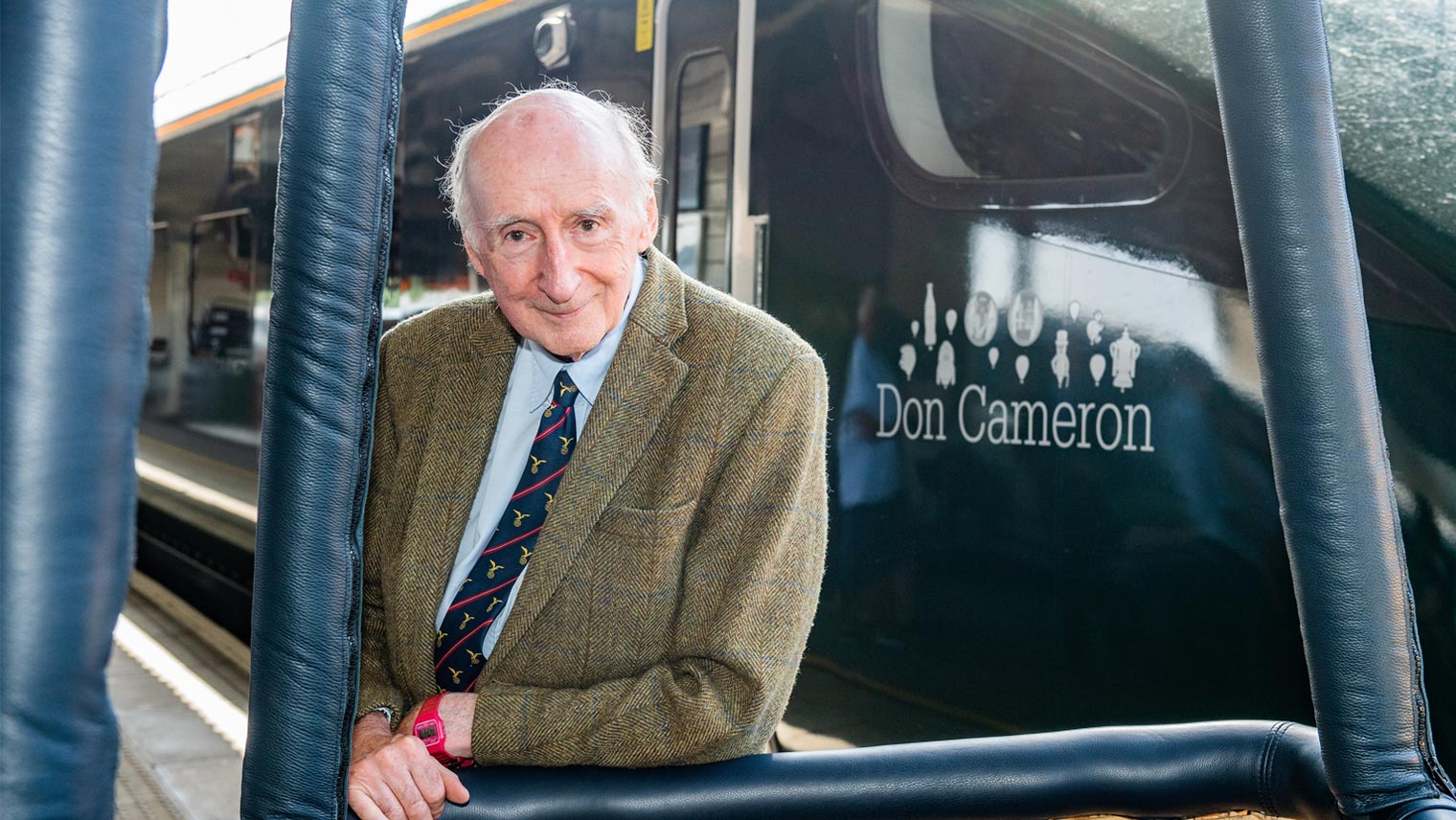 Pictured: Don Cameron standing in front of 800026
Pictured: Don Cameron standing in front of 800026
In 1979, Cameron launched Bristol International Balloon Fiesta, which is the biggest of its kind in Europe.
Among his many achievements, Cameron was the first to cross the Alps and the Sahara by hot-air balloon and crossed the Atlantic in 1992.
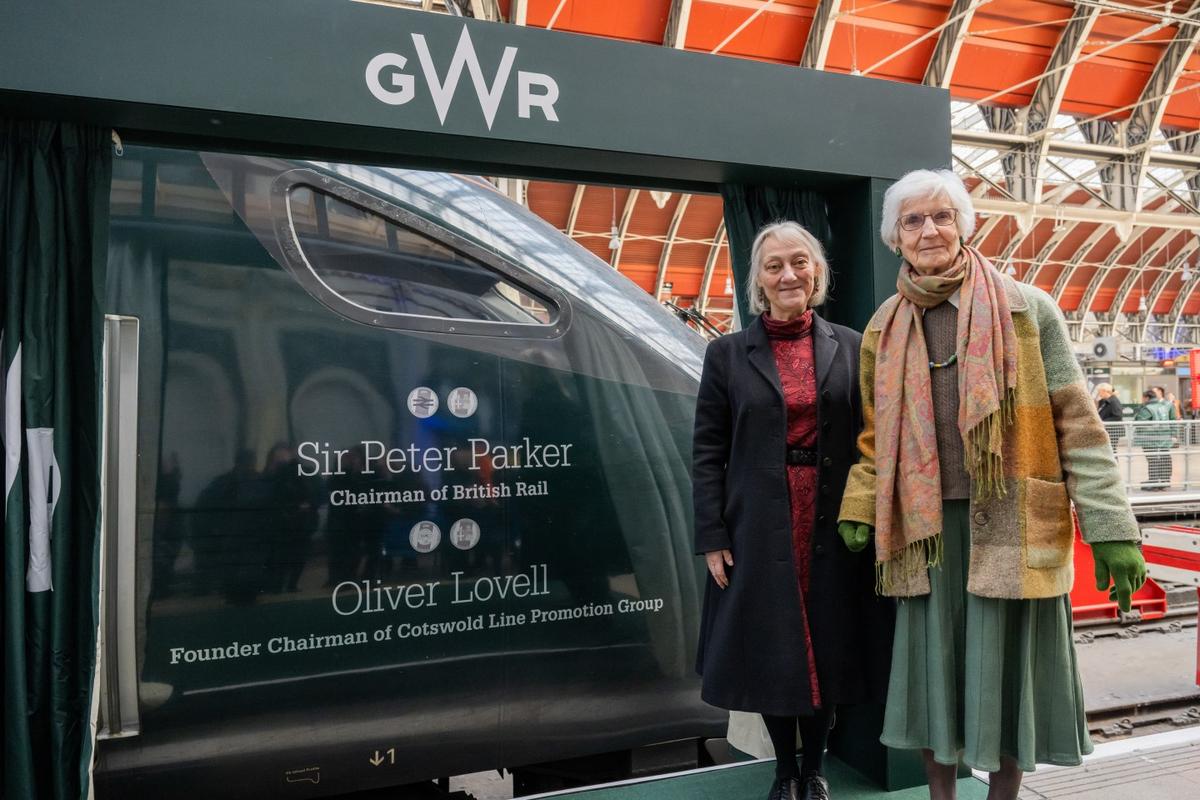
800028 pays tribute to two Great Westerners who did so much for the North Cotswold railway route and the national rail system – Oliver Lovell and Sir Peter Parker.
Family, friends and former colleagues attended a ceremony at London Paddington on Thursday 30 November.
Oliver Lovell
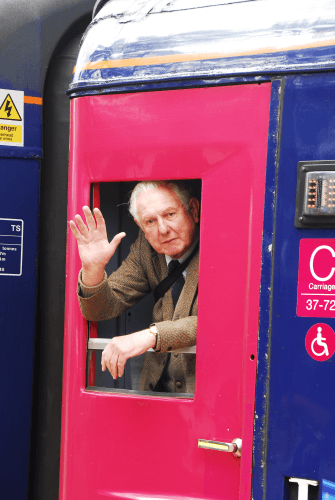
Oliver was the founding chairman of the Cotswold Line Promotion Group, formed in March 1978 with the original purpose of opposing the possible closure of the line. He sat on the committee continuously until his sudden death in the summer of 2013. The new waiting room at Morton-in-Marsh was named in his honour in 2019.
The group has gone from strength to strength and helped with improvements along the line, including securing the reopening of Honeybourne station and financial contributions to Morton-in-Marsh and Hanborough station improvements.
Oliver’s sister, Diana Barr, said:
"It is an extremely proud moment for us and I know he would have been thrilled and honoured by this recognition."
Sir Peter Parker
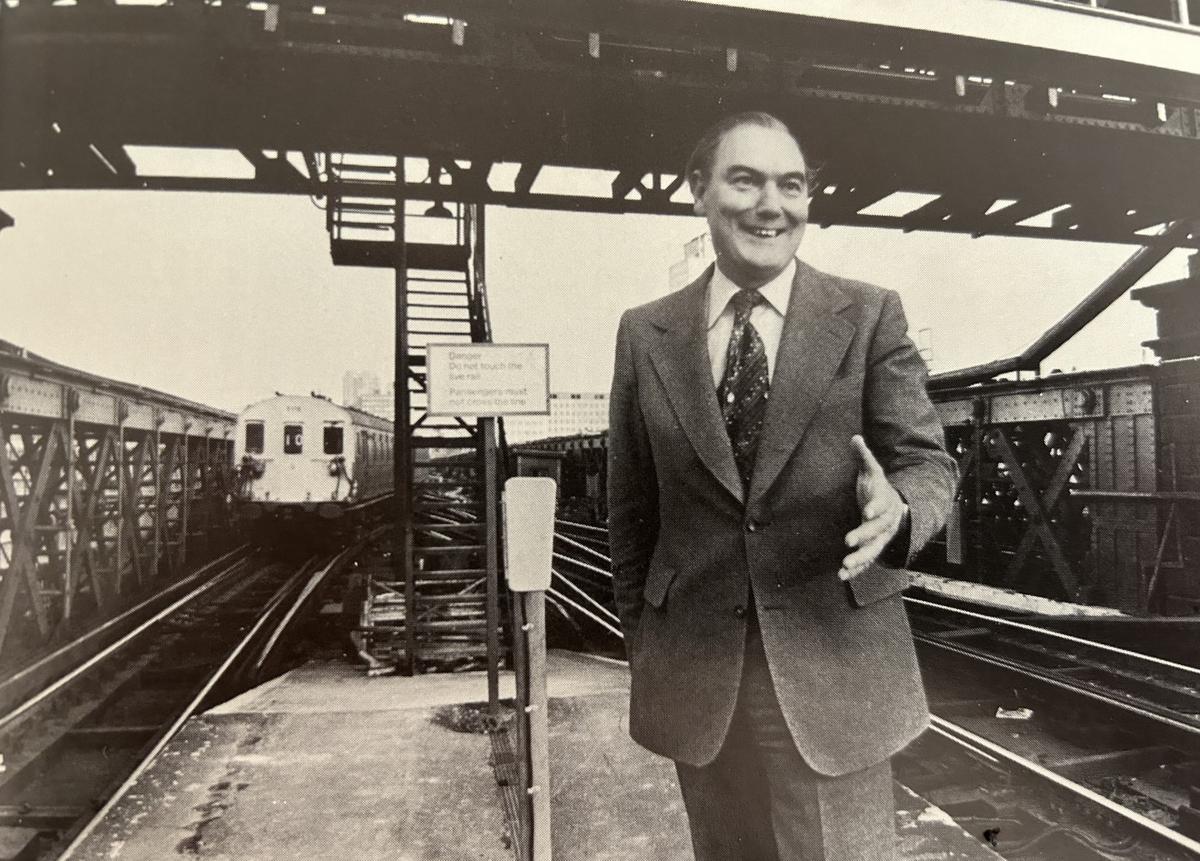
Sir Peter was chairman of the British Railways Board from 1976 to 1983 and a powerful friend of the Cotswold Line, regularly using Charlbury station. He is remembered with deep affection for an effective management style which helped transform the reputation of Britain’s railways in the eyes of the public.
Lucy Parker, Sir Peter’s daughter, said:
"To have this train carrying his name as it travels along the tracks would have thrilled my father. He loved the people of the railway community and to be honoured in this way would have made him more proud than words can say."
- Somerset community heroes Christopher Dando and Evette Wakely travelled on 800029 after it was named in their honour at Taunton Station on 17 February 2022.
Care home manager Christopher and fundraising postie Evette were named BBC Make a Difference Superstars for selflessly helping others at the height of the pandemic.
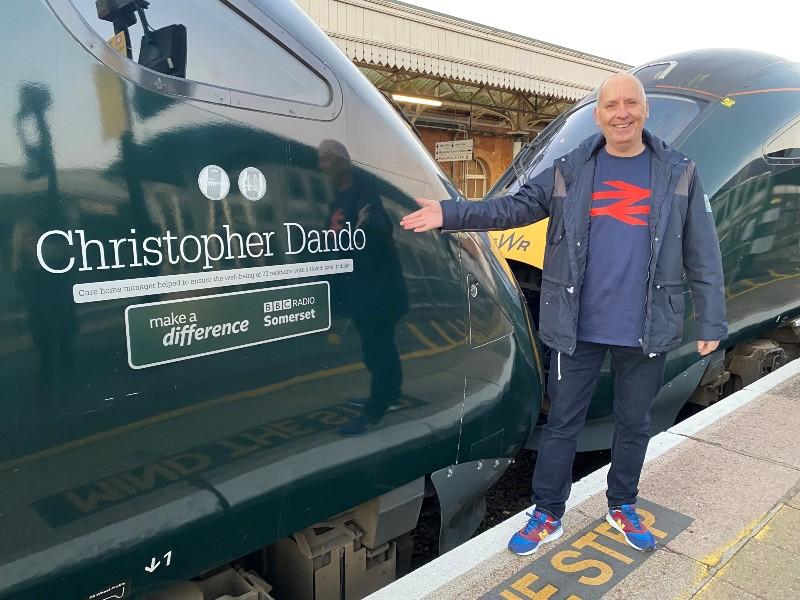 Pictured: Christopher Dando
Pictured: Christopher DandoChristopher Dando
Christopher, from Westbury-sub-Mendip, helped to ensure the safety of 23 residents at Court House Retirement Home in Cheddar by gathering a team of carers who voluntarily locked themselves into a safe bubble for the benefit of their residents.
Christopher and eight colleagues moved into the home for 12 weeks, working round-the-clock to keep the pandemic at bay.
Christopher, who went without seeing wife Alison and daughters Chloe and Edith, led by example, working in the kitchen, helping with personal care, emptying rubbish, cutting the grass and organising morale-boosting events for residents and staff.
Wells MP James Heappey said:“Many of us have lost loved ones and had to make sacrifices over these past couple of years, but it’s thanks to people like Christopher and his team who have managed to keep community spirits alive.”
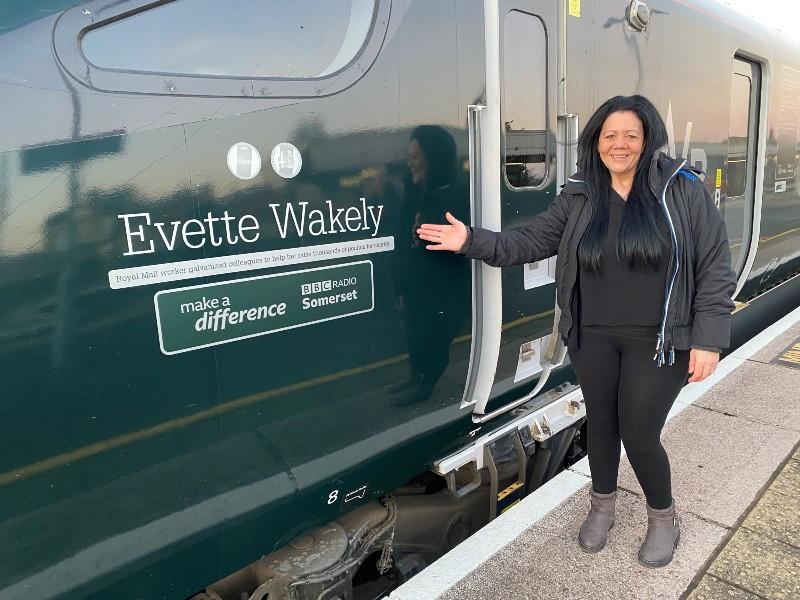 Pictured: Evette Wakely
Pictured: Evette Wakely
Evette Wakely
Royal Mail worker Evette put a smile on residents’ faces by galvanizing a team of 12 fancy-dress colleagues to deliver the post and raise money for the Love Musgrove Covid-19 Response Fund, helping nurses and patients at Musgrove Park Hospital in Taunton. Within a month they had raised more than £5,000.
She also arranged for a convoy of Royal Mail vans to deliver a gift to a girl awaiting major heart surgery, as well as spearheading a fundraising month to raise £2,695 for the homeless and raising another £3,500 for St Margaret’s Hospice in Taunton.
Evette also helped raise thousands of pounds for Elliot’s Touch, a charity in Watchet helping to fund research and find cures for Cardiomyopathy in Children and Mitochondrial Disease.Taunton Deane MP Rebecca Pow said:
“It’s because of people like Evette that we’ve managed to get through these difficult couple of years, and it’s absolutely fitting that GWR and BBC Radio Somerset have honoured her in this way.”
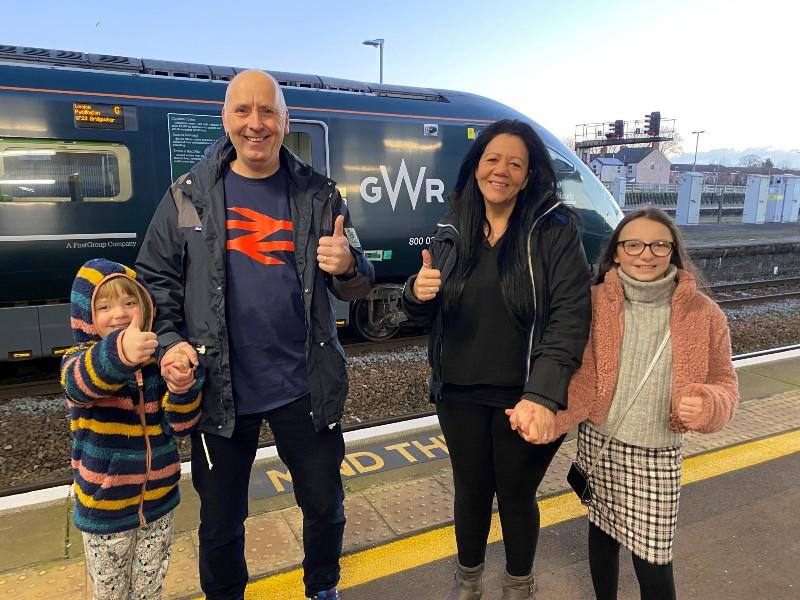 Pictured: Evette Wakely with family
Pictured: Evette Wakely with family
Mini-marvels Lincoln Callaghan and Henry Cleary were the first BBC Make A Difference Superstars to be celebrated during a ceremony at Paddington station on July 5 2021.
 Pictured: Lincoln Callaghan and Henry Cleary at their train naming ceremony
Pictured: Lincoln Callaghan and Henry Cleary at their train naming ceremony
The dynamic duo were given a guard of honour by station colleagues before being invited to unveil their train by Rail Minister Chris Heaton-Harris.
The pair were selected as BBC Make a Difference Superstars by judges following a link-up between the BBC and GWR to celebrate those people going above and beyond to help others in their communities during the pandemic.
Lincoln Callaghan
Lincoln was aged just five when he got on his bike to answer an SOS from his beloved Didcot Town Football Club.
Didcot, known as The Railwaymen, launched an appeal in April 2020 to raise £10,000 to help ends meet during the pandemic.
Lincoln asked dad Chris if they could do a cycle ride to help raise funds and used the exercise time allowed to complete the 100k challenge and raise more than £2,250. The duo then started an online scratch card competition which raised a further £1,000.Didcot Town director and trustee Roger Neal said:
“It was incredibly difficult for us to keep going during the pandemic and the fantastic work Lincoln has done literally helped us to keep the lights on.”
Henry Cleary
Henry, from Stoke Poges, Buckinghamshire, was aged just seven when he decided to run a marathon after becoming concerned about the plight of homeless people during the pandemic.
His target was to raise £262 – £10 per mile for homelessness charity Crisis – but the Star Wars-loving schoolboy raised more than £10,000.
Henry managed to complete his marathon in just nine days, with a sprint finish at the end! He was cheered on every day by neighbours and key worker children from his school, who took to the streets to clap as he ran past.
Crisis Chief Executive Jon Sparkes said:
“Our year-round work to support people out of homelessness is only possible because of people like Henry. He really is a superstar in our eyes and we’re really pleased to see his amazing efforts recognised in such a wonderful way.- 800031 honours Hereford and Worcestershire community heroes Charlotte Marsland and Mazen Salmou, who were named BBC Make a Difference Superstars for selflessly helping others at the height of the pandemic.
Family and friends joined them for a special train-naming ceremony at Hereford Station on 25 August 2021.
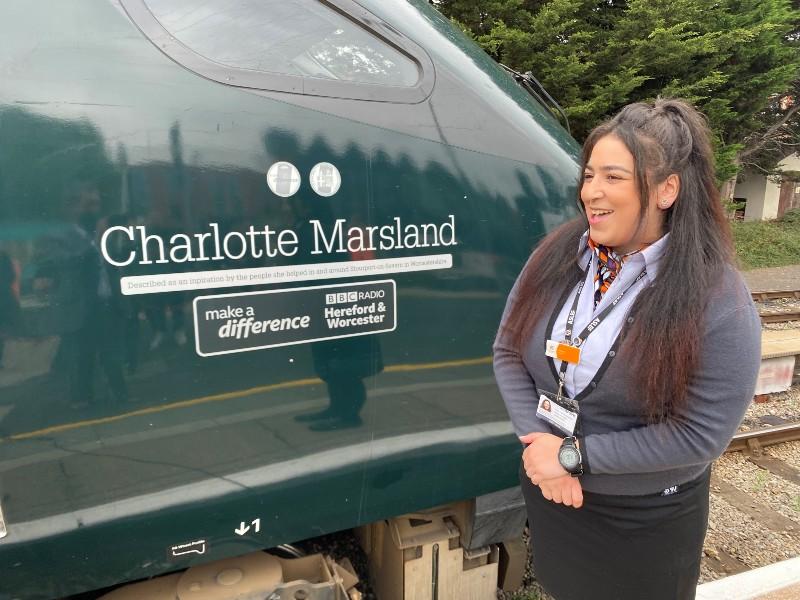 Pictured: Charlotte Marsland
Pictured: Charlotte Marsland
Charlotte Marsland
Charlotte, a driver for West Midlands Trains, set up the Stourport Mutual Aid Facebook group to help isolated people and was described as having “outstanding and unselfish devotion to the people of Stourport-on-Severn”.
Dozens of volunteers came forward to support hundreds of families in the area, delivering Easter treats, food and prescriptions, as well as providing dog-walking services and telephone buddies.
Charlotte, who went on to set up a mini foodbank, said she had been inspired to help by her grandad, Terry Murphy, who had been worried by the plight of others like him during the pandemic. Mr Murphy has since passed away.
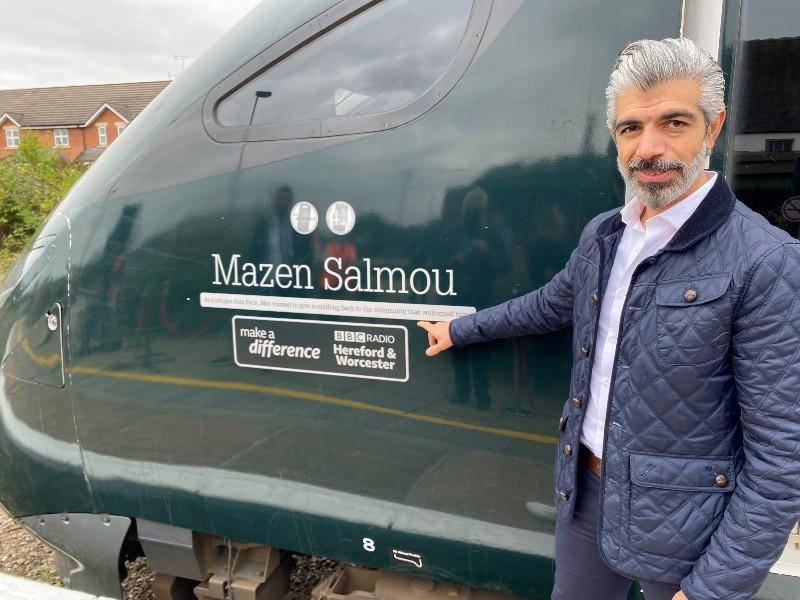 Pictured: Mazen Salmou
Pictured: Mazen SalmouMazen Salmou
Originally from Syria, Mazen moved to Bromsgrove as part of Worcestershire County Council’s refugee settlement programme and set off on a one-man mission to “help the community that has welcomed me”.
He made films to present the town in a positive light and also volunteered for the Bromsgrove Community Support Group, running countless errands to help vulnerable people during lockdown, delivering supplies including pharmacy prescriptions on his bike.
Great Western Railway Interim Regional Development Manager (East) Tom MacLachlan, who attended the ceremony at Hereford, said:
“Mazen and Charlotte went to incredible lengths to support their communities and we were thrilled to add their names to the side of an Intercity Express Train.”
Pictured: Mazen Salmou and Charlotte Marsland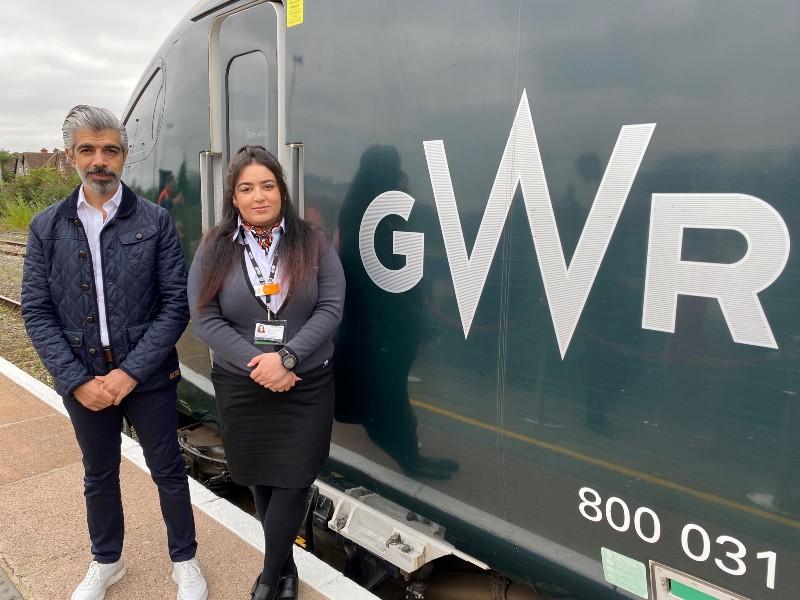
- 800032 honours two BBC Make a Difference Superstars from the Bristol region who selflessly helped others at the peak of the pandemic.
Nailsea Support Group volunteer Iain Bugler, who sadly passed away in July 2020, and emergency volunteer response mastermind Sarah Williams-Martin BEM were selected by judges following a link-up between the BBC and GWR.
Iain’s widow Kate was joined by family and friends for a posthumous tribute at Bristol Temple Meads on 28 February 2022, while Sarah attended with husband Christopher.
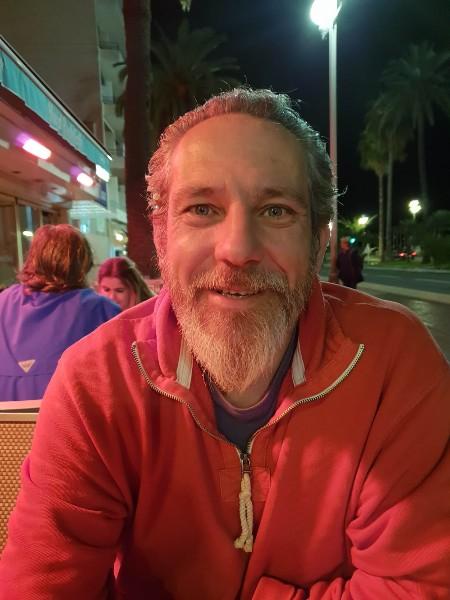 Pictured: Iain Bugler
Pictured: Iain Bugler
Iain Bugler
Iain had just completed chemotherapy and radiotherapy treatment when coronavirus restrictions were introduced in March 2020.
He joined the Nailsea Support Group and, with the help of local businesses, launched a hot-food delivery service for those in need. From 70 meals a week the operation soon increased to 250, and by the end of the first lockdown, more than 2,500 meals had been delivered.
Unfortunately Iain required further treatment that summer and sadly developed pneumonia, passing away on 1 July, aged 51.
North Somerset MP Dr Liam Fox said:
“It is truly remarkable that having been through so much himself, Iain joined the Nailsea Support Group and played such a key role in supporting our community through that first lockdown. This posthumous tribute by GWR and BBC Radio Bristol is truly fitting for Iain.”
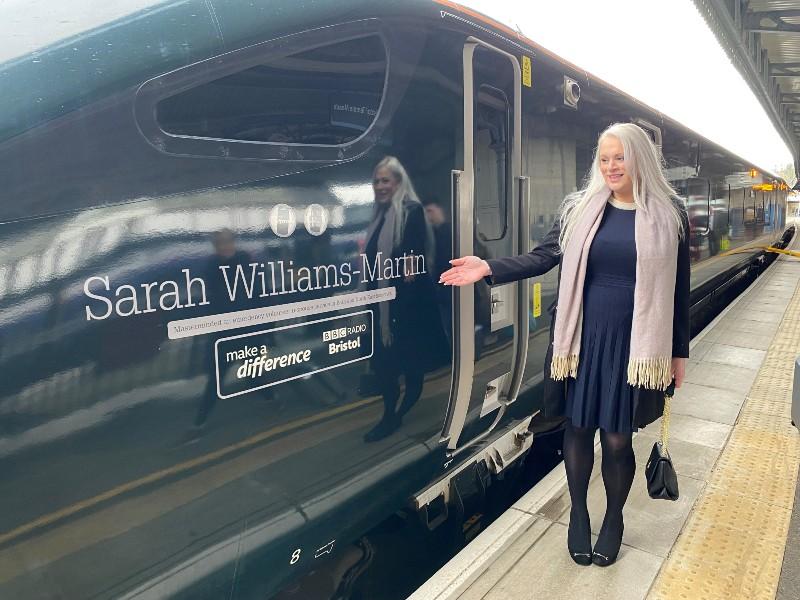 Pictured: Sarah Williams-Martin
Pictured: Sarah Williams-Martin
Sarah Williams-Martin BEM
Sarah, from Melksham, voluntarily managed the Compassionate Community Emergency Volunteer Response in Bath and North East Somerset at the height of the pandemic. She was awarded the British Empire Medal in the Queen’s New Year honours as a result of her unstinting work.
Sarah built a database to manage the 2,500 volunteers who signed up and matched them to support people during Covid-19, sending out 85,000 leaflets to raise awareness of the help available, and helping over 4,000 individuals and families get essential food and medication. She also designed packs for those living with dementia to help support them and their carers during lockdown.
She also developed a payment system which allowed for shopping worth more than £150,000 to reach those in need, personally sought help for more than 500 individuals to rehabilitate them back into independence, and recruited and managed more than 1,000 volunteers at the large vaccination centre at Bath Racecourse.
Chippenham MP Michelle Donelan said:
“Our communities came together during lockdown because of people like Sarah and it is because of them that we have managed to get through these very difficult couple of years.” - Gloucestershire community heroes Martin Heath and Emma Hurrell travelled on 800033 after it was named in their honour at Gloucester Station on 4 March 2022.
Fancy-dress runner Martin and food-delivery champion were chosen as BBC Make a Difference Superstars for selflessly helping others at the peak of the Covid-19 pandemic.
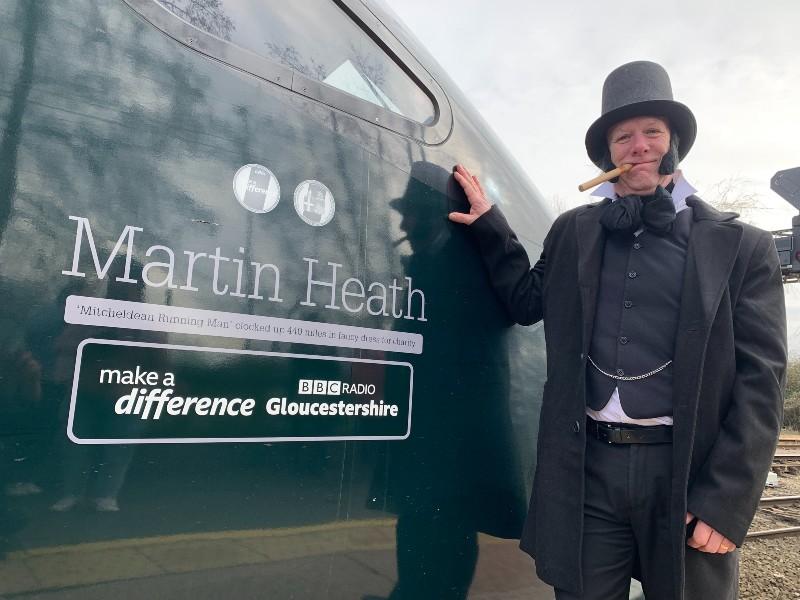 Pictured: Martin Heath
Pictured: Martin HeathMartin Heath
During the first lockdown, Martin – who wore a special Isambard Kingdom Brunel outfit for the ceremony – clocked up a total of 440 miles over 101 days, raising community spirits by running in a different fancy-dress costume every day.
Parents praised his efforts for giving their children something to look forward to, while older members of the community said he had eased their feelings of isolation.
More than 300 villagers turned out to cheer him on for his last run and he was even given a police escort. Martin’s gruelling efforts helped raise £840 for Muscular Dystrophy UK and £1,390 for Great Oaks Hospice Forest of Dean.
Forest of Dean MP Mark Harper said:
“I’m really pleased that Martin Heath – the Forest of Dean’s Mitcheldean Running Man – is getting a well-deserved, lasting piece of recognition for his superb fundraising efforts for worthy causes including the brilliant Great Oaks Hospice.
“During challenging times, Martin put a smile on the face of many in the Forest of Dean, so I thank GWR and BBC Radio Gloucestershire for paying tribute to him in this way.”
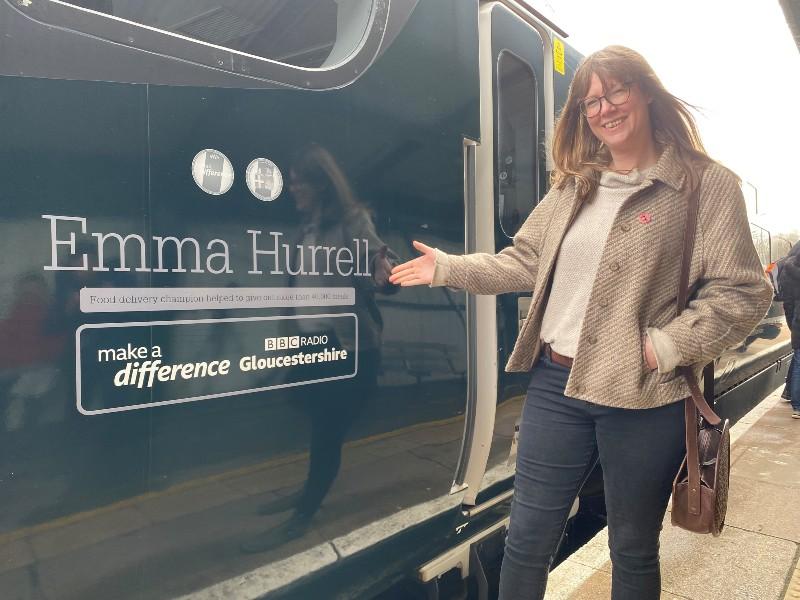 Pictured: Emma Hurrell
Pictured: Emma Hurrell
Emma Hurrell
Emma works at the Long Table social enterprise, which provides pay-as-you-can meals for the people of Gloucestershire from its community canteens in Brimscombe and Matson.
Emma and her team could have easily decided to go on furlough at the outbreak of the pandemic, but instead created the Feeding the Five Thousand campaign that cooked and delivered over 40,000 meals around the county during lockdown.
They fed NHS frontline workers, people in homeless shelters, those on low incomes and people who were shielding or quarantining.
Stroud MP Siobhan Baillie said:
“The Long Table was at the very heart of our community throughout the pandemic, with Emma at its core. They ensured thousands of people remained well-fed – including NHS frontline workers and the homeless.
“I love visiting them and I am delighted that Emma’s name will now adorn a GWR train to mark her outstanding contribution to our community and the Long Table.”
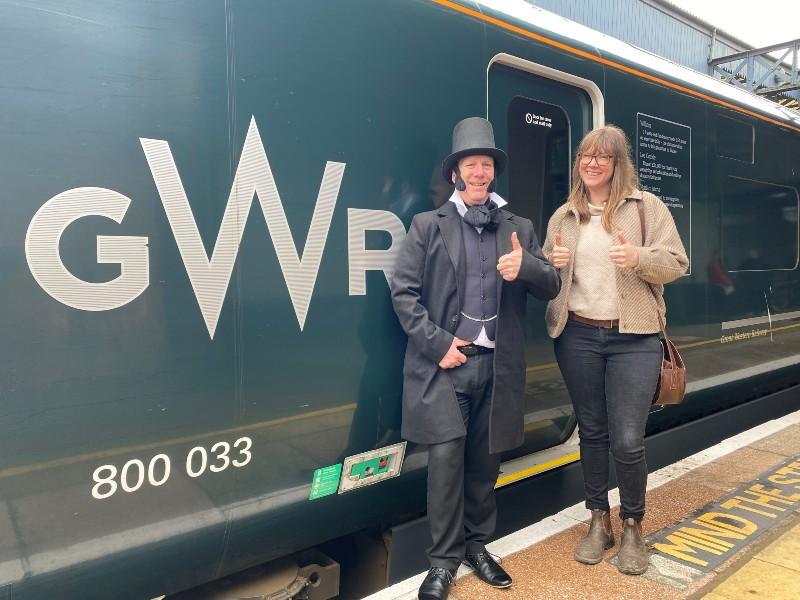 Pictured: Martin Heath and Emma Hurrell
Pictured: Martin Heath and Emma Hurrell - 800034 honours two BBC Make a Difference Superstars who went above and beyond to help others at the height of the Covid-19 pandemic.
Sewing bee Tracy Devlin, from Bracknell, inspired volunteers to make PPE for thousands of people across Berkshire, while Jo Prosser masterminded a project in Bicester to provide one million meals for NHS frontline staff.
Tracy was honoured at Reading Station on March 7 2022, while Jo travelled on her train after seeing it for the first time at Oxford Station on July 12 2022.
 Pictured: Tracy Devlin
Pictured: Tracy Devlin
Tracy Devlin
At the start of lockdown, childminder Tracy began voluntary work with the PPE team at Garth Hill College, making scrubs to donate to local hospitals, doctors’ surgeries, care homes, schools and vet practices.
She then formed the Facebook group Rainbow Scrubs, a team of volunteers from across Berkshire, collecting donations and making anything from scrubs to masks and headbands.
Throughout the pandemic Tracy and her crew made and donated 1,447 scrubs, 5,020 masks, 2,530 scrubs washbags, 1,250 headbands, 853 ear savers, 141 hats, 60 bandanas, 135 crocheted hearts and 225 ‘Frontline Hero’ bears.
Rainbow Scrubs also raised more than £2,100 for local causes and were donated four second-hand iPads which they presented to the Oakwood unit at Prospect Park Hospital in Reading.
Tracy also became a coordinator for the collection and delivery of numerous donations of fabric, ribbons and buttons.
Bracknell MP James Sunderland, who joined Tracy at Reading Station, said:
“Tracy’s selflessness throughout the pandemic in setting up Rainbow Scrubs and providing vital PPE to the likes of care homes and doctors’ surgeries is an example to us all.”
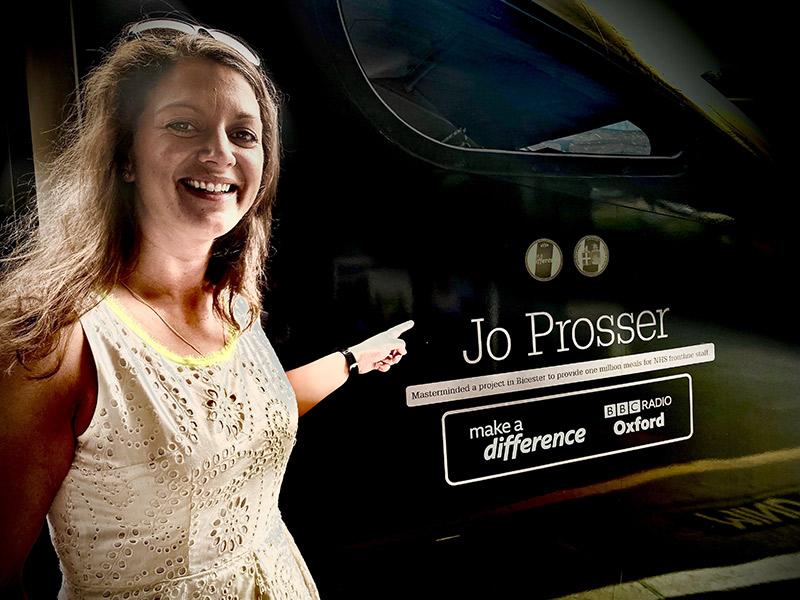
Jo Prosser
Jo left behind her husband and much-loved dog in Lincolnshire for four months to spearhead a Salute the NHS project in Bicester co-founded by Ron Dennis CBE, founder of F1 team McLaren.
As lead operations director, she worked tirelessly to coordinate 800 volunteers to deliver one million meals, boxes, bags and 75,000 soothe and care packs to the NHS. She showed her full array of skills, from driving a forklift to managing orders, packing boxes and liaising with all the teams involved.
Always working with a smile, Jo proved an inspirational leader, setting up visits with potential partners, key celebrities and even a Royal guest.
Victoria Prentis, MP for Banbury (including Bicester), said:
“Jo is a true unsung hero. It is because of the efforts of people like her that we made it through the last couple of difficult years. Jo worked tirelessly to deliver over one million meals for NHS frontline staff in Bicester. It is brilliant to see her honoured in this unique way by GWR and the BBC.” - Wiltshire community heroes Liz Gallagher and Naomi Betts travelled on 800035 after it was named in their honour at Swindon Station on 3 March 2022.
Hospital hero Liz Gallagher and ‘mask tree’ creator Naomi Betts were chosen as BBC Make a Difference Superstars for selflessly helping others at the peak of the Covid-19 pandemic.
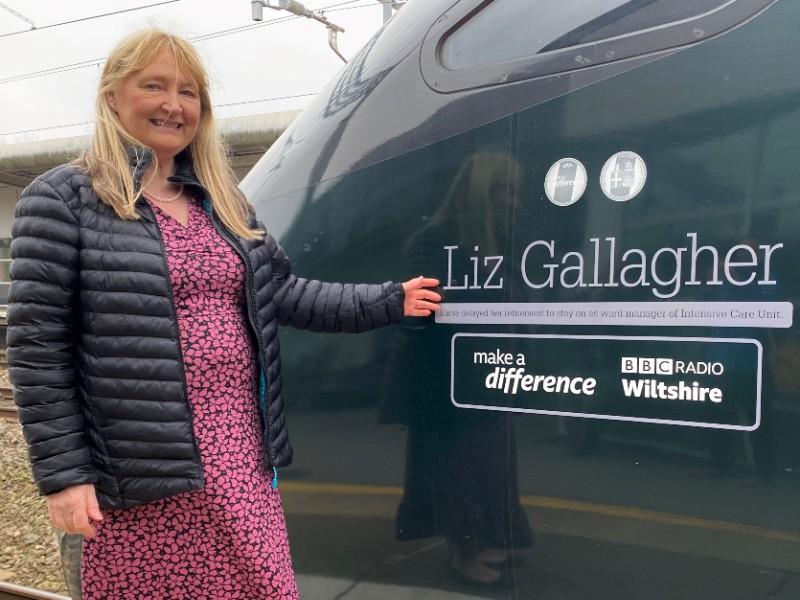 Pictured: Liz Gallagher
Pictured: Liz Gallagher
Liz Gallagher
At the height of the pandemic, Liz, a nurse of more than 40 years’ experience, delayed her retirement to stay on as ward manager of the Intensive Care Unit at Swindon’s Great Western Hospital.
As well as ensuring the ICU had sufficient ventilators and PPE, Liz set up a second unit to cope with Covid-19 patients.
Liz remains at the hospital in a part-time nursing capacity and helped with the rollout of the vaccination programme at STEAM – Museum of the Great Western Railway.
South Swindon MP Sir Robert Buckland, who joined the winners at Swindon Station, said:
“We all know that our NHS has gone above and beyond throughout the pandemic, but no-one more so than Liz, who delayed her retirement to stay working on the very frontline at the Great Western Hospital.”
 Pictured: Naomi Betts
Pictured: Naomi Betts
Naomi Betts
Naomi created a mask tree to hang the face coverings she had been sewing for anyone in the community who needed them. Her social media post went viral and led to more than 400 trees being registered across the UK.
During the first lockdown Naomi’s community mask tree raised £3,200 for the Hope for Hasti charity and delivered almost 4,000 reusable face coverings.
With the help of her team she also installed a ‘mask tree’ in Salisbury District Hospital, distributing 2,000 reusable face coverings and raising more than £2,000 for The Stars Appeal, while a sustainability event in Salisbury saw a further 1,000 masks given away.
Nationally, more than 200,000 masks were donated, raising more than £325,000 for charity.
Salisbury MP John Glen said:
“Before March 2020, I’m not sure many people will have had face coverings as one of their essential daily items; however, when the pandemic hit the likes of Naomi stepped up to provide that much-needed protection for our community, as well as raising money for charity in the process.”
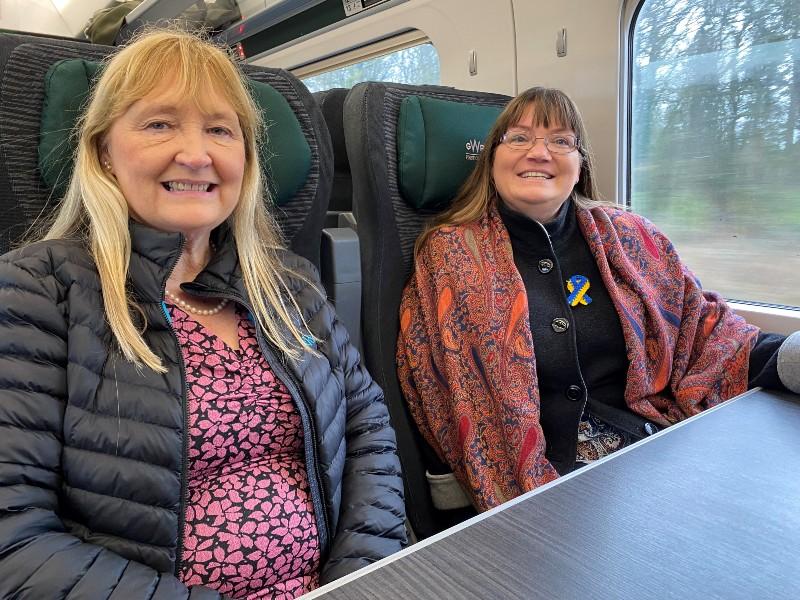 Pictured: Liz Gallagher and Naomi Betts
Pictured: Liz Gallagher and Naomi Betts - Civil rights pioneer Dr Paul Stephenson OBE was present to see a train named in his honour on 30 October 2020 as Great Western Railway celebrated Black History Month.
Dr Paul Stephenson OBE
 Dr Paul Stephenson at his train naming.
Dr Paul Stephenson at his train naming.
Dr Stephenson has been dedicated to fighting for equality and civil rights for the British African-Caribbean community for more than 60 years.
In 1963 he led a boycott of the Bristol Omnibus Company, protesting its refusal to employ Black or Asian drivers or conductors. After a 60-day boycott supported by thousands of Bristolians, the company revoked its colour bar.
Then a year later he achieved national fame when he refused to leave the city’s Bay Horse pub until he was served, resulting in a magistrates’ court trial of which he was rightly acquitted.
It was his determination to fight for an end to discrimination during these campaigns that led to Harold Wilson sending Dr Stephenson a telegram saying: “I will do something about this”. A year later, in 1965, the first Race Relations Act was passed.
Dr Stephenson was awarded an OBE in 2009 ‘for his services to equal opportunities and to community relations in Bristol’ and in 2017 received a Pride of Britain Award for Lifetime Achievement.
Mayor of Bristol Marvin Rees said:
“Dr Paul Stephenson has been dedicated to fighting for equality and civil rights for more than 60 years and I’m delighted that Great Western Railway should choose to honour one of our greatest Bristolians in this way.
“Black History Month gives us an opportunity to celebrate Black contributions to British society and it is fitting that GWR has Dr Stephenson to the list of those Great Westerners whose names adorn its trains.”
- GWR marked 100 years since the end of the Great War by unveiling a special train for fallen railway workers.
800306 features the names of all 2,545 men who worked for GWR and died during the war. The Roll of Honour features details of where they worked for the company, their rank, regiment, where they were killed and where they are either remembered or buried.
During a special remembrance service at Paddington station on Friday 9 November 2018, the train was also named after two of those who died, Lance-Corporal Allan Leonard Lewis VC, and Flight Sub-Lieutenant Harold Day DSC.
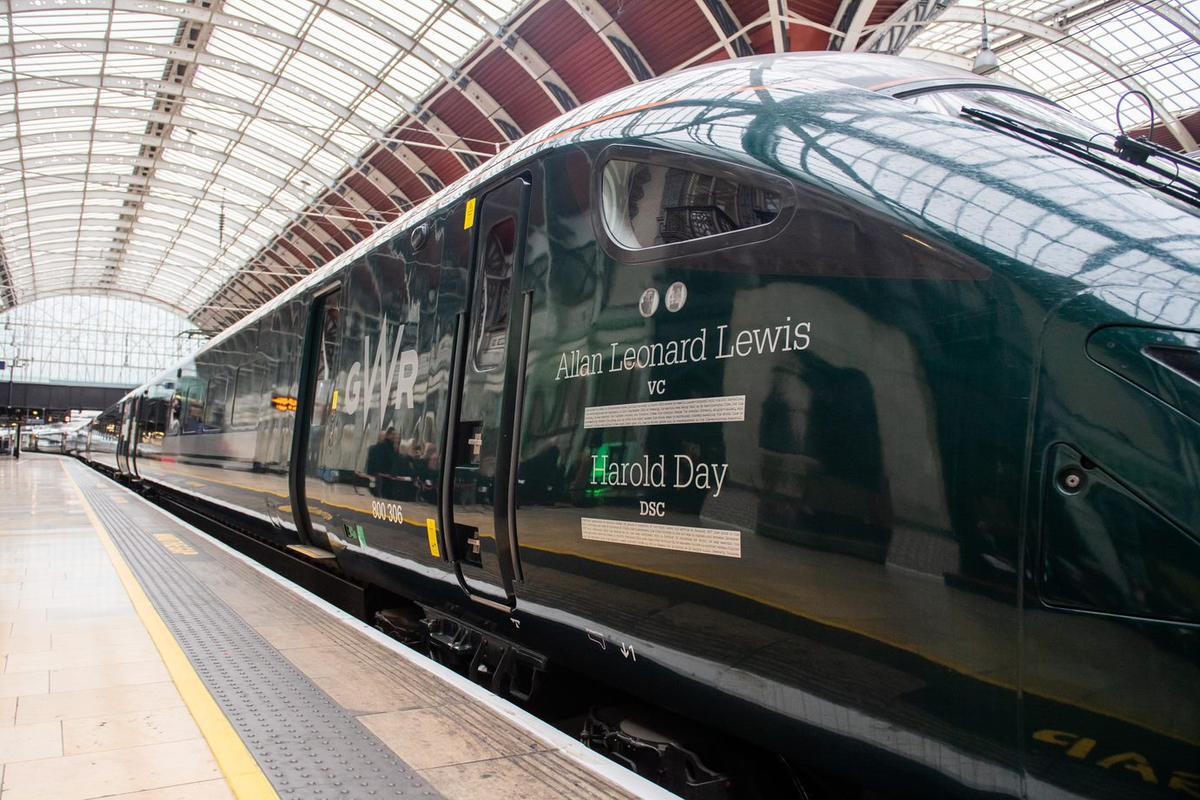 Pictured: The 800306 in Paddington station, on Friday 9 November 2018.
Pictured: The 800306 in Paddington station, on Friday 9 November 2018.
Lance-Corporal Allan Leonard Lewis VC
Why Lewis was omitted from the original GWR Roll of Honour remains a mystery.
Born in Herefordshire, Lewis moved to South Wales to find work and was employed by GWR as a bus driver in Neath before joining the Army in March 1915.
GWR has no record of Lewis on its Rolls of Honour or War memorials, and it may be that he joined up without the company’s agreement, and thus lost his post and pension rights.
On 18 September 1918 at Rossnoy, near Lempire, France, Lewis was in command of a section held up by intense machine-gun fire. He crawled forward alone, successfully bombed the guns and by rifle fire made the whole team surrender. Three days later he rushed his company through the enemy barrage but was killed while getting his men under cover from heavy machine-gun fire. This heroic deed led to the award of the Victoria Cross.
Great Niece Dawn Lewis said:
“Why Allan was never included on the GWR Roll of Honour is a mystery, but I am thrilled that his extraordinary valour is now commemorated in such a spectacular and moving way.”
Flight Sub-Lieutenant Harold Day DSC
Day is recognised as the only railwayman to become a flying ace during the First World War.
Born in Abergavenny, he joined GWR as a premium apprentice at the Swindon Works. He joined the Royal Naval Air Service in January 1917, just before his 19th birthday.
His ability as a fighter pilot was proved with his first victory in August that year and between December 1917 and his death in February 1918 his status as an ace was guaranteed with a further 10 victories. He was awarded the Distinguished Service Cross.
Immediately after his last victory on 5 February 1918, his Sopwith Camel N6379 collapsed while diving on enemy aircraft at excessive speed, and crashed at Harnes, near Lens, France.
Great nephew Nicholas Blake said:
“Our memories of Harold are limited to the recollections of our grandparents, who spoke of him with fondness and sadness. His ability as a pilot is clear and he was daring and courageous without question. We are thrilled that his day will be associated with the company he worked for in this way.” Second World War pilot Ken Rees, who played a vital part in the ‘Great Escape’ from a German prisoner-of-war camp, was honoured during a ceremony at Swansea station on 7 May 2021.
Wing Commander Ken Rees
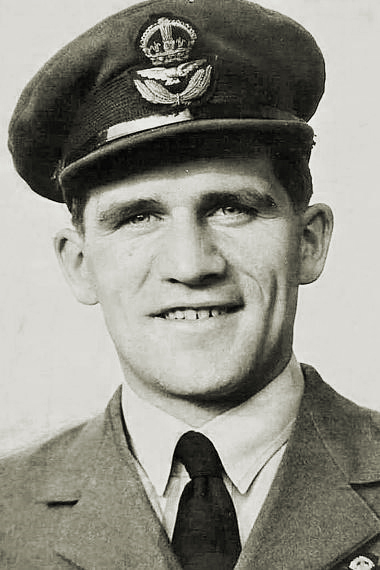
Second World War Wing Commander Ken Rees.
A pilot with Bomber Command, Ken was shot down over Norway in October 1942 just two weeks after getting married.
He was taken to Stalag Luft III, a prisoner camp designed for captured airmen and the scene of the ‘Great Escape’.
Ken was a digger on the Tunnel ‘Harry’, the longest of all the tunnels and the one used in the escape. In the film of the famous mission, Steve McQueen’s character is said to be based on Ken due to his antagonistic attitude towards his captors, a result of his brother-in-law, Sqn Ldr Harold Starr, being shot and killed while parachuting to safety.
After the war Ken became a flying instructor and later commanded a Valiant V-bomber squadron. In 1967 he commanded the RAF’s island staging post at Gan in the Indian Ocean before retiring a year later. He passed away in August 2014, aged 93.
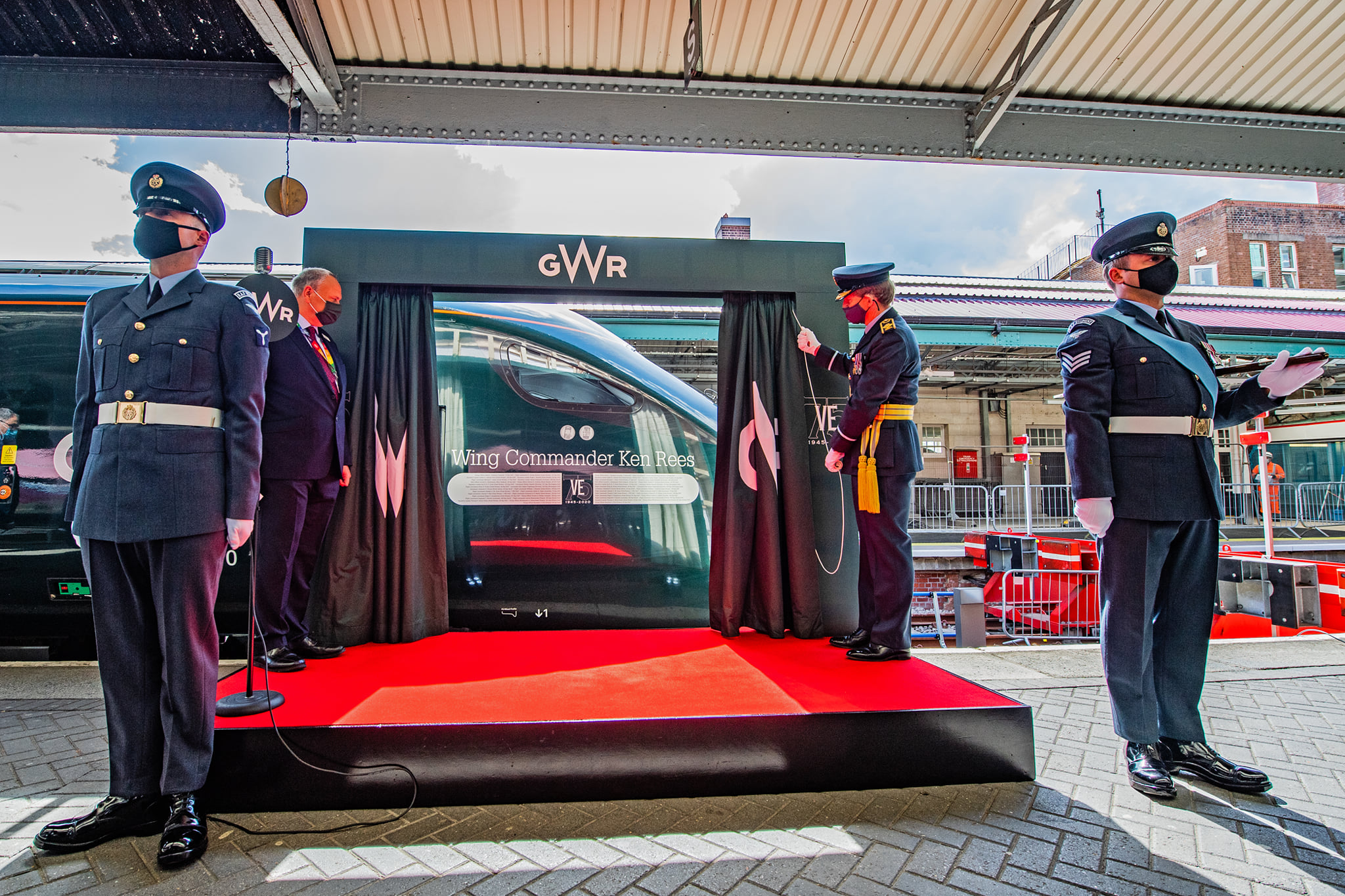 The unveiling of Wing Commander Ken Rees' named train.
The unveiling of Wing Commander Ken Rees' named train.
Among those present at the train-naming ceremony were RAF Air Officer for Wales, Air Commodore Dai Williams, the RAF Queen’s Colour Squadron, and Parliamentary Under-Secretary of State for Wales, David TC Davies.
A message was also played from Ken’s son Martyn, who lives in Australia and was unable to attend the ceremony because of COVID-19 travel restrictions.
Martyn said:
“The family would like to thank Great Western Railway for commemorating my father today. He was a proud Welshman who served his country during the war and for many years after as an officer in the RAF.
“This wonderful acknowledgement of his service is something about which he would be both bemused and thrilled.”- Highly-decorated World War Two spy Odette Hallowes GC MBE was honoured during a memorable ceremony at Paddington station on 6 March 2020.
HRH Princess Royal performed the train naming in front of guests including members of Odette’s family, representatives from the First Aid Nursing Yeomanry and members of the French Embassy.
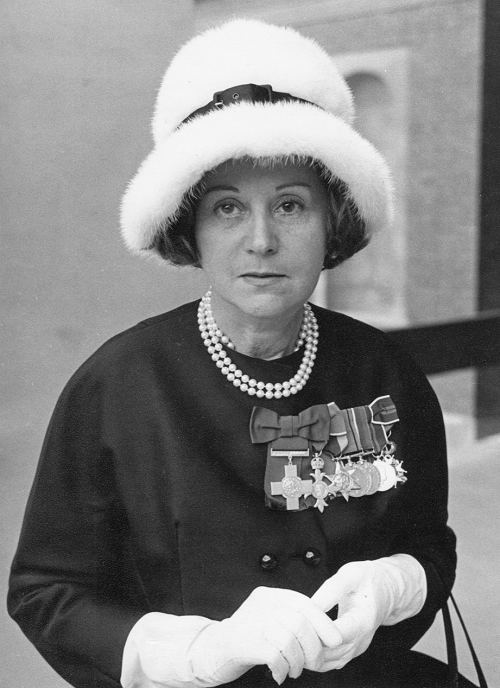 Pictured: Odette Hallowes
Pictured: Odette Hallowes
Odette Hallowes GC MBE
Odette was a French citizen who lived in London and on the Devon and Somerset border. She became a Special Operations Executive (SOE) and the most highly-decorated spy of the war.
Captured by the Gestapo in 1943 and interrogated 14 times, Odette convinced her captors she was related to Winston Churchill. Believing she could be useful, her life was spared. She was attached to the First Aid Nursing Yeomanry as cover for her secret work on behalf of SOE.
The train naming ceremony formed part of a series of events marking International Women’s Day on 8 March. After the ceremony the train formed the 1132 London Paddington to Bristol Temple Meads service and was operated by an all-female crew and dispatched at stations on route by female dispatch staff.
As well as Odette’s name, the train carries 16 badges of the SOE representing the 16 women who served in this unique unit but never returned home.
Odette’s granddaughter, Sophie Parker, said:
“It means so much to our family that Odette is being recognised and remembered in this most moving way. Odette’s story is one of courage, dignity and hope; all of which were so important to her during her wartime service, and in overcoming the torture she suffered.
“I know Odette would be extremely humbled by this honour, and would want it seen as a tribute to all those brave women of the Special Operations Executive, especially those who never returned home.”
- The Lionesses have been given pride of place for their Euro 2022 heroics – on the side of Intercity Express Train 800316.
A special vinyl tribute was added the morning after England’s epic 2-1 extra-time win over Germany at Wembley on Sunday 31 July 2022.
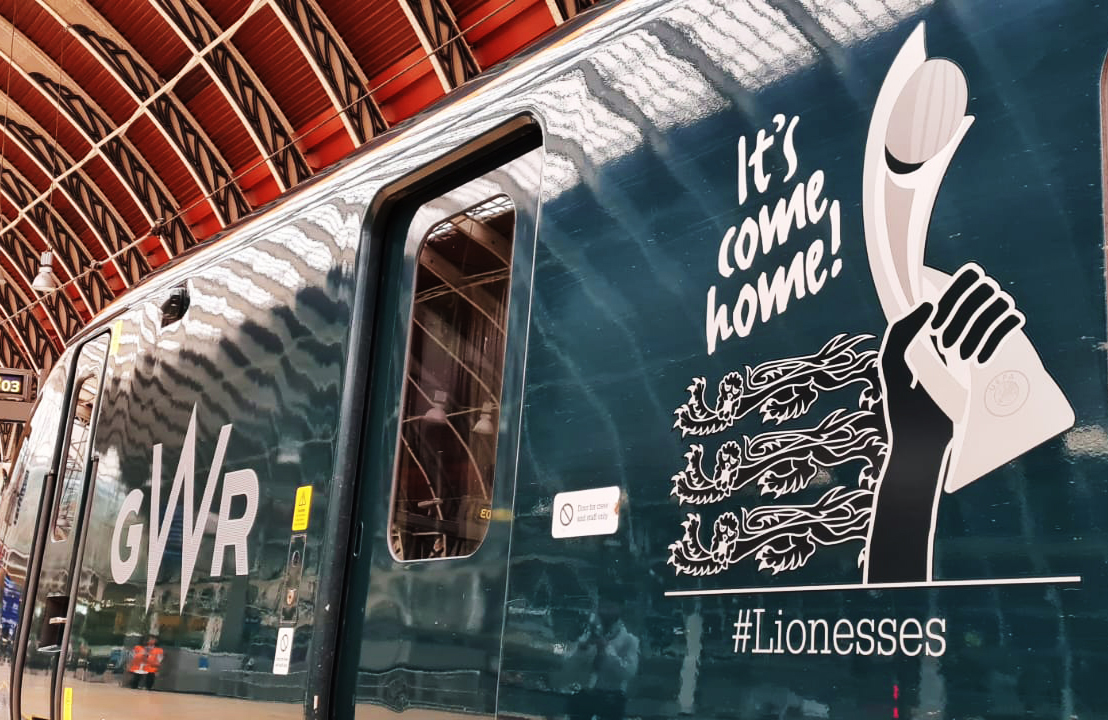
800316
Football came home in glorious style as substitute Chloe Kelly scored a dramatic 110th minute winner to spark delirious scenes among a record European Championship crowd of 87,192.
Ella Toone had come off the bench to put England in front just after the hour, only for Germany’s Lina Magull to equalise and send the game into extra-time.
GWR Human Resources director Ruth Busby watched the big match with her family and was overjoyed by the result.
Ruth said:
“The Lionesses have captured the hearts of the nation with their performances over the past month and I’m delighted we are celebrating their Euro 2022 triumph on one of our Intercity Express Trains.
“We at GWR have a long and proud history of celebrating Great Westerners – past and present heroes from across our network – and the Lionesses are truly worthy of recognition for bringing football home in such brilliant style.” - An emotional ceremony took place at London Paddington on 22 September 2021 as Freya Bevan unveiled and then travelled on a train named in her honour.
Freya, who was joined at the ceremony by her mum Katherine, dad Paul and sister Liv, sadly passed away a couple of months later and we are proud 800317 will provide a lasting tribute to the courage she displayed throughout her young life.
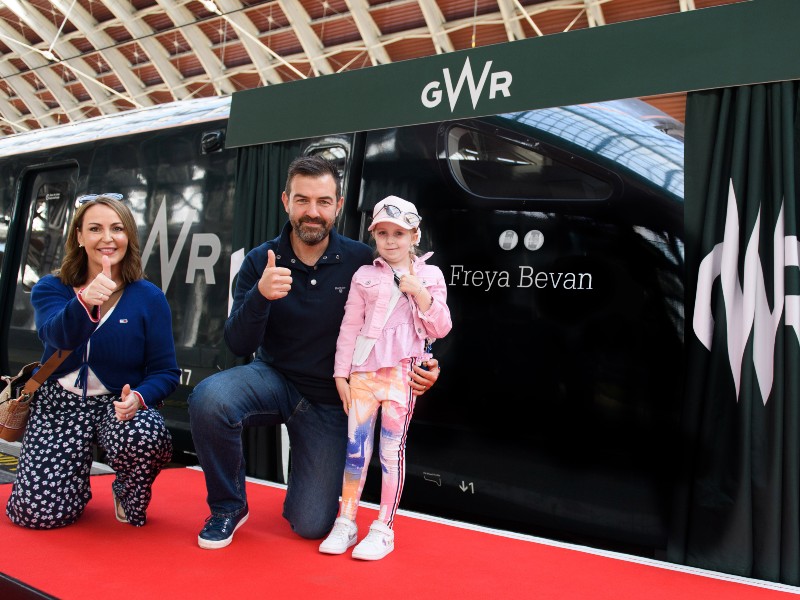 Pictured: Freya Bevan
Pictured: Freya Bevan
Freya Bevan
Freya was diagnosed with a Primitive Neuroectodermal Tumour (PNET) when she was just a baby and underwent pioneering treatment in America after her family raised £110,000 to fund the trip.
Sadly, in October 2020, an MRI scan revealed a second tumour had grown and she returned to America for further Proton Beam Therapy with the same doctor who had treated her previously.
When a third tumour was discovered Freya began pioneering treatment involving a new drug from Germany, but she sadly passed away on 27 December 2021.
A family tribute read:
“Our hearts are completely broken, as we share the news with you that heaven has gained the most sweetest and most beautiful warrior there ever was.
“Our brave, beautiful, precious Freya is now healed from cancer and getting big cwtches in heaven from her beloved great grandmother.”
- Plymouth fundraiser Steve Whiteway was celebrated in an emotional ceremony at the city’s station on October 15 2020.
Steve had been fighting pancreatic cancer and sadly passed away a day after 802002 had been named in his honour.
Steve Whiteway
Steve’s fundraising efforts spanned more than 50 years and saw him raise £750,000 for more than 160 charities including Devon & Cornwall Food Action, Fair Trade Plymouth and Plymouth Climate Change Commission.
It was those years of dedicated service to the community that saw him voted by the public as one of GWR’s 100 Great Westerners.
His fundraising began at the age of eight – playing Christmas Carols at a care home – and continued into his adult life. He received the British Citizen Award (BCA) for services to the community in January 2020.
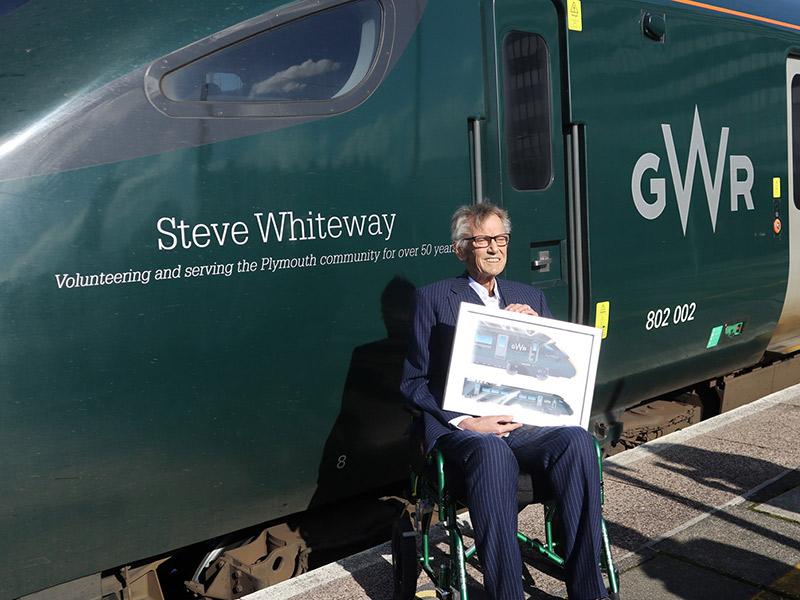
Steve, who was joined at Plymouth Station by a small group of friends and family, said:
“This is tremendous – I’m honoured and humbled. I feel very good that this has happened to me and it’s also for the causes I have supported.
“I’ve been lucky. I had the opportunity to make other people’s lives better and I’m gobsmacked to see that the little things I do can be a big thing in people’s lives."
GWR Head of External Communications Dan Panes said:
“The 100 Great Westerners celebrate remarkable people from across our network and Steve was a brilliant example of this. We are proud to name one of our IETs after someone who dedicated his life to supporting so many within his community.” - D-Day veteran and fundraiser Harry Billinge was there to personally name Intercity Express Train 802006 at a ceremony in Penzance on 7 October 2020.
A Cornwall connection was completed when the opposite end of 802006 was named after BBC Make a Difference Superstar Donovan Gardner and his late wife Jenifer on 19 August 2021.

Pictured: Harry Billinge at the naming ceremony of the Intercity Express Train 802006 in Penzance on 7 October 2020.
Harry Billinge
A veteran of D-Day, Harry was 18 when he landed in the first wave at Gold Beach in 1944. He was a sapper attached to the 44 Royal Engineer Commandos and was one of only four from his unit who survived. He went on to fight in Caen and the Falaise Pocket in Normandy.
Harry was awarded an MBE in the 2019 New Year Honours List for his extraordinary fundraising efforts in St Austell for the Normandy Memorial, where he has raised more than £50,000.
The train also honours those from Harry’s unit with the symbol of a Commando beret next to Harry’s name, plus the 22,442 men who were lost during the Normandy landings, with this number displayed next to the train’s identification number.
He said: “I am thrilled that this train is being named after me, but this is about remembering the fine men who fought that day, lots of whom never went back home again.
“It’s important that their memory is remembered, and I hope this train will carry that message to thousands of people every day.”
Harry sadly passed away on 5 April 2022, aged 96.
 Pictured: Donovan Gardner MBE at the naming ceremony for Intercity Express Train 802006 on 19 August 2021
Pictured: Donovan Gardner MBE at the naming ceremony for Intercity Express Train 802006 on 19 August 2021
Donovan and Jenifer Gardner
Foodbank champion Donovan Gardner MBE was named a BBC Make a Difference Superstar in September 2020 for selflessly helping others at the peak of the pandemic.
He dedicated more than 11 years to the Transformation CPR foodbank in Camborne and captured the nation’s hearts during an emotional appearance on BBC Two’s Cornwall with Simon Reeve.
Don set up and ran the foodbank with his wife Jenifer, who died suddenly in August 2020. He was interviewed about the cause the day before his wife’s funeral. Donations of about £280,000 poured in when the show aired – securing the charity enough funding for 4 years.
After finding out he’d been named a BBC Make a Difference Superstar, Don dedicated the honour to his late wife of 53 years.
A special train-naming ceremony was held at Penzance Station.
Camborne and Redruth MP George Eustice said:
“It is great to see Don recognised in this most iconic way. Don has been at the heart of our community, raising help and awareness for those in need. I am pleased to see that his goodwill will now reach even further than Cornwall.” Joey, the star of the National Theatre's acclaimed production of War Horse, made a rare off-stage appearance at London Paddington as 802007 was named after him and his creator, Michael Morpurgo.
Commuters watched in awe as the life-sized horse, Joey – created by Handspring Puppet Company – trotted from the iconic war memorial on Platform 1 to greet Morpurgo on Platform 8.
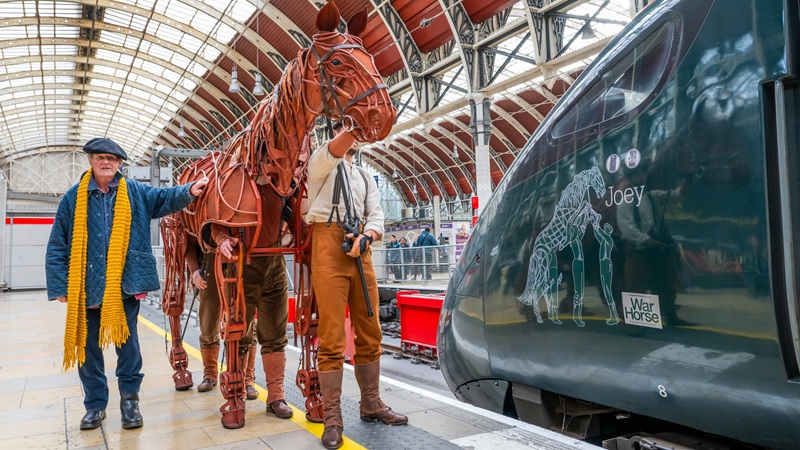
Michael Morpurgo / Joey
War Horse tells the remarkable story of Albert and his beloved horse, Joey, set against the backdrop of the First World War.
Morpurgo’s best-selling novel, first published in 1982, has sold more than two million copies worldwide and been translated into more than 44 languages.
Since being adapted for stage it has become the most successful play in the history of the National Theatre, winning more than 25 major awards. Steven Spielberg later directed a film version which debuted in 2011.
Guests to the train naming included representatives from Farms for City Children, a charity founded by Michael and his wife Clare nearly 50 years ago, which offers children from urban areas the opportunity to experience life on a farm.
Michael said: "Having my name on the side of a train is not something I ever thought I would see, so to have that honour alongside Joey, who has been in my life for more than 40 years, fills me with joy."
"I’m grateful to GWR and the National Theatre for allowing Joey to be part of this special day, and for GWR’s ongoing work with local organisations like Farms for City Children, showing their commitment to supporting communities beyond just getting from A to B."
- Heroic feats were commemorated during an emotional ceremony at the Long Rock train depot open day in Penzance on 13 April 2019.
802008 was named after Rick Rescorla, a Cornishman who saved thousands of lives during the 9/11 terror attacks in New York, and Solomon Browne, the Penlee Lifeboat lost at sea during a daring rescue attempt in 1981.
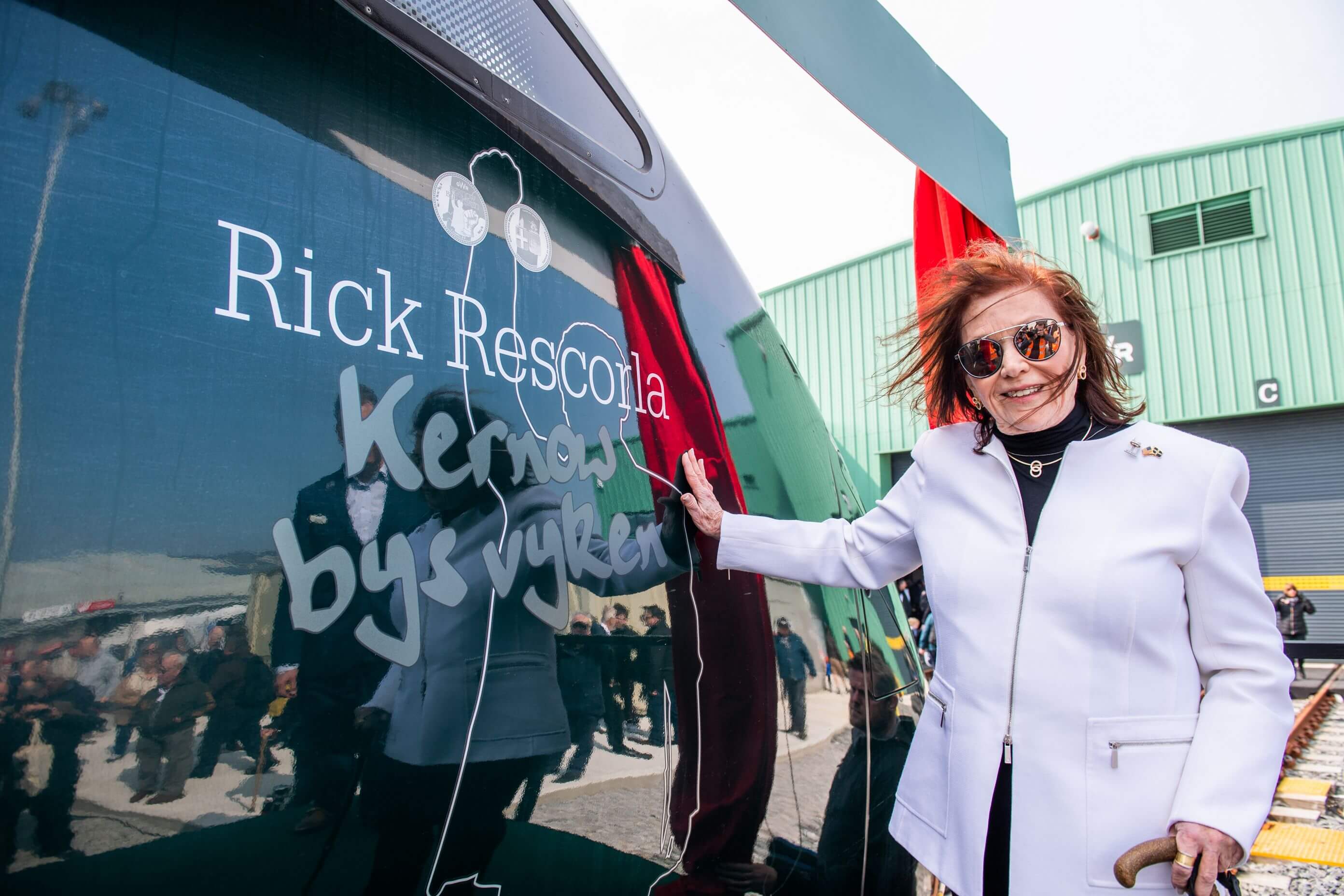 Pictured: Rick’s widow Susan attended the ceremony in Penzance on 13 April 2019.
Pictured: Rick’s widow Susan attended the ceremony in Penzance on 13 April 2019.
Rick Rescorla
Born in Hayle, Cornwall, Rick became a US citizen in the 1960s and was head of security for Morgan Stanley, a bank based in the south tower of the World Trade Center in New York.
When the terror attack happened on 11 September 2001, Rick evacuated more than 2,500 employees, singing Cornish songs as he went. He then returned inside and was last seen on the 10th floor looking for more people to evacuate.
The 62-year-old was one of 2,605 people who died when the two towers collapsed. His body was never recovered.
Rick’s widow Susan attended the ceremony along with friends and family who live in the US and Cornwall. She said:
“Rick was so proud of his Cornish roots. To know he is being honoured in this way and is remembered with such fondness is great comfort. I know he would be so proud of this.”
 Pictured: The train naming ceremony at the Long Rock train depot.
Pictured: The train naming ceremony at the Long Rock train depot.
The RNLB Solomon Browne
The crew of the Penlee Lifeboat were lost at sea on 19 December 1981 when it launched to rescue the passengers and crew of the vessel Union Star.
The cargo ship’s engines had failed in heavy seas and wind speeds of up to 100mph. Solomon Browne was able to pull alongside and rescue four people.
The lifeboat radioed that ‘we’ve got four off’, but that was the last heard from either vessel. In all, 16 people died, including eight volunteer lifeboat crew.
The names of coxswain William Trevelyan Richards, mechanic James Madron, Nigel Brockman, Charles Greenhaugh, John Blewett, Kevin Smith, Barrie Torrie and Gary Wallis feature on the side of the train.
A spokesperson for Penlee Lifeboat said:
“What an amazing day at the GWR open day where some of Cornwall’s heroes were recognised. An emotional day for us all.”
- Part of GWR’s commemoration of 75 years since the end of World War 2, Cpl George Sheard was honoured during a naming ceremony in his home city of Plymouth on 14 October 2020.
A Cornwall connection was completed when the opposite end of 802010 was named after BBC Make a Difference Superstar Kieron Griffin and his dog Ocha on 19 August 2021.
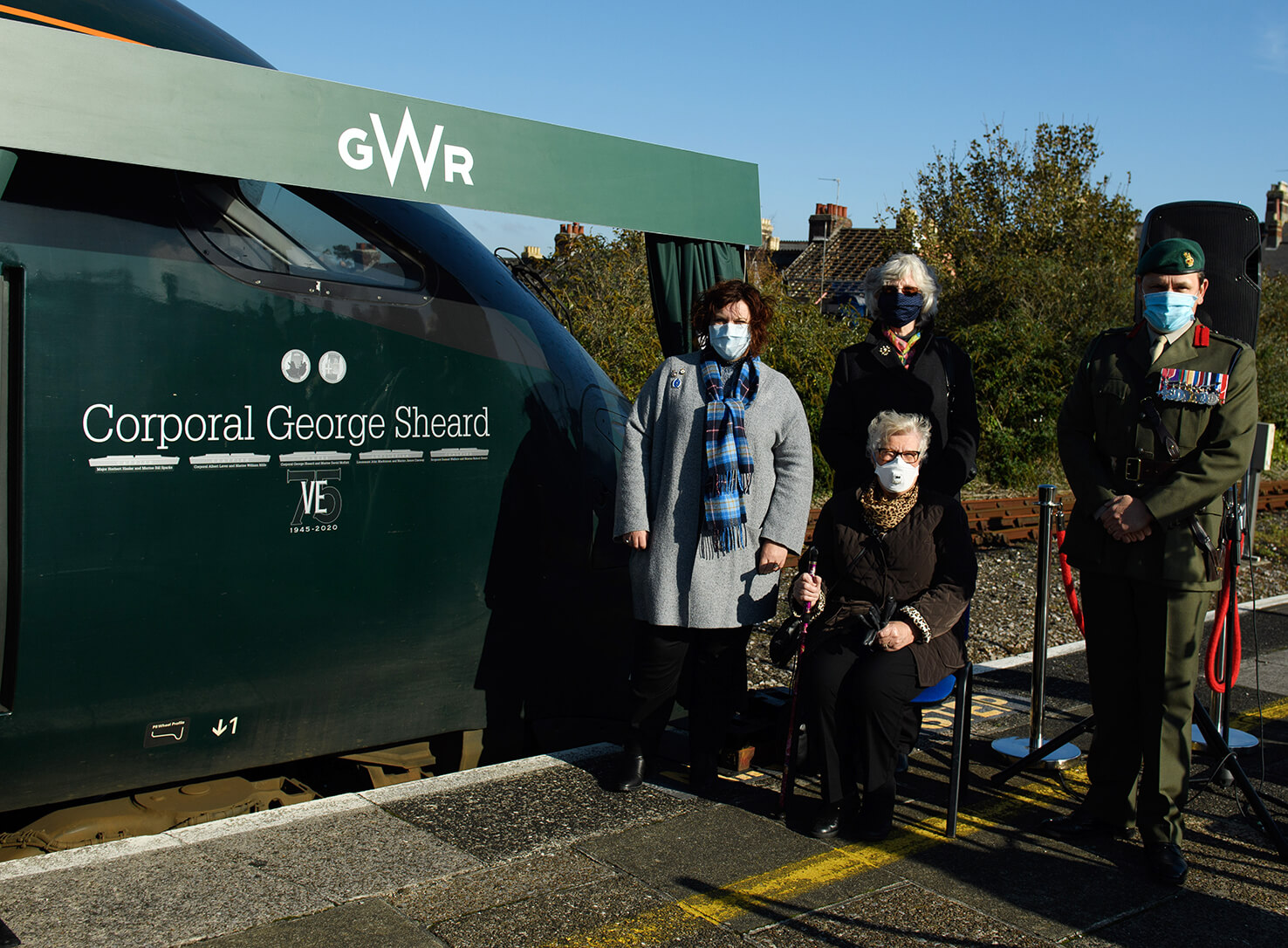 Pictured: Sarah Holmes, Great Niece of George Sheard, with family members.
Pictured: Sarah Holmes, Great Niece of George Sheard, with family members.
George Sheard
George was one of the 10 Royal Marine Commandos who took part in Operation Frankton – a daring mission to destroy German supply ships in Bordeaux Harbour.
They became known as ‘Cockleshell Heroes’, travelling by kayak up the River Gironde from the Bay of Biscay to plant limpet mines to cargo ships which were supplying the Germany war effort.
Of the 10 men who went on the mission in December 1942, only two survived, six were captured and subsequently executed and two drowned – one of them being George Sheard, aged 27. The names of all those who took part in one of the most famous raids of the war are also carried next to Corporal George Sheard’s name.
Major General Matt Holmes CBE, Commandant General Royal Marines, said:
“It’s a great honour that GWR has decided to name a train after Cpl George Sheard for his sacrifice and for us to enjoy the freedoms of travel in memory of his service.”
 Pictured: Kieron Griffin and his dog Ocha at the naming ceremony for Intercity Express Train 802010 on August 19 2021.
Pictured: Kieron Griffin and his dog Ocha at the naming ceremony for Intercity Express Train 802010 on August 19 2021.
Kieron Griffin and Ocha
Teenage fundraising star Kieron Griffin was named a BBC Make a Difference Superstar in September 2020 for selflessly helping others at the peak of the pandemic.
Kieron has a rare genetic condition called Cardio Facio Cutaneous Syndrome which affects him in many ways. He is partially sighted, has epilepsy, scoliosis and low muscle tone among other issues. But that didn’t stop him taking a leaf out of Captain Sir Tom Moore’s book by walking ten laps of his garden every day in support of the Royal Cornwall Hospital.
He had to shield during lockdown because of his genetic disability but his sponsored walks saw him raise £5,135 for the Covid-19 fund and Child Health at the Royal Cornwall Hospital in Truro.
He raised a further £585 for the Acute Liaison Nurses at RCH on his 18th birthday, proving himself to be a true inspiration and helping those around him through lockdown.
A special train-naming ceremony was held at Penzance Station, honouring Kieron and his beloved dog Ocha.
Truro and Falmouth MP Cherilyn Mackrory said:
“Kieron Griffin’s fundraising efforts during the pandemic are incredible by any standard, but when taking into account the challenges he faces in his day-to-day life, are simply astonishing.
“I could not think of a more worthy recipient of having a train named after him, and I would like to thank GWR and the listeners of BBC Radio Cornwall for making this happen.” 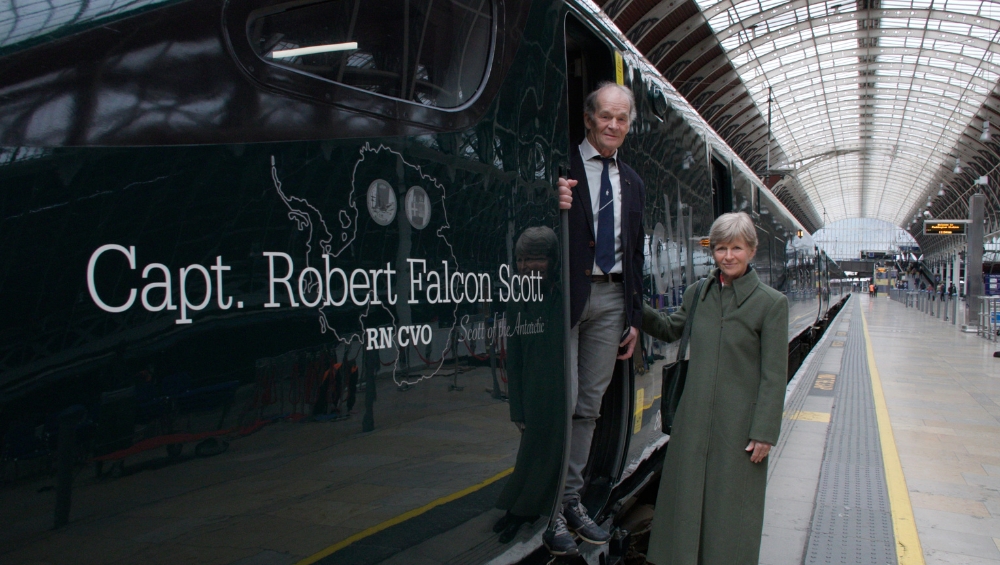
802011 celebrates two of Plymouth’s most famous sons, explorer Capt Robert Falcon Scott and portrait painter Sir Joshua Reynolds. It was named on 5 December 2018.
Capt Scott’s name was later dedicated in a special ceremony at London Paddington on 22 April 2024, attended by Friends of the Scott Polar Research Institute, Scott’s grandchildren Falcon and Dafila, and legendary British explorer Sir Ranulph Fiennes.
Capt Robert Falcon Scott
Born in Devonport, Plymouth, on June 6, 1868, Scott began a distinguished career in the Navy at 13 and a chance encounter with the president of the Royal Geographical Society led to him signing up for the British National Antarctic Expedition in 1901.
Important biological, geological and zoological findings led to it being hailed as one of the great polar expeditions and when the team returned home in 1904, Scott became a national and international hero. He was promoted to captain before King Edward VII bestowed on him the honour of Commander of the Royal Victorian Order.
In 1910, Scott set his sights on a return to the Antarctic on the now infamous Terra Nova Expedition, aiming to become the first to reach the South Pole.
Thwarted by misfortunes from the off, Scott and his team reached the Pole on January 7, 1912, only to discover that a Norwegian team had reached the same spot five weeks previously.
Defeated, the team continued, but bad weather meant that, one-by-one, they succumbed to the elements. Scott is presumed to have died on 29 March, 1912.
The SPRI was founded in 1920 as a national memorial to Scott and his companions. It investigates issues relevant to the Arctic and Antarctic and is home to the Polar Museum in Cambridge. Prof Julian Dowdeswell, Emeritus Professor at the SPRI, said:
“Captain Scott’s two expeditions laid many of the foundations for interdisciplinary science in Antarctica, a legacy that is particularly important in today’s rapidly changing climate. The Institute is delighted that Scott’s achievements continue to be recognised by the naming of a GWR train in his honour.”
Sir Joshua Reynolds
Sir Joshua was born at Plympton, Plymouth, on 16 July, 1723, the son of a headmaster and fellow of Balliol College, Oxford, providing him a more educated background than most painters of the time.
Through study of ancient and Italian Renaissance art, and that of Rembrandt, Rubens and Van Dyck, Reynolds developed into one of the major European portrait painters of the 18th century.
In 1740 he was apprenticed to the fashionable London portraitist Thomas Hudson. He spent 1749-52 abroad, mainly in Italy, and set up practice in London shortly after his return.
He soon established himself as Britain’s leading portrait painter, though he was never popular with George III. When the Royal Academy of Arts was formed in 1768, Reynolds was elected its first President.
Although believing that history painting was the noblest work of the painter, he had little opportunity to practise it, and his greatest works are his portraits.
Reynolds lost the sight of his left eye in 1789, forcing him into retirement. After a period of illness, he died on 23 February, 1792.
A ceremony was held at Castle Cary station on 9 April 2019 to mark the naming of 802013 after Glastonbury Festival co-creator Michael Eavis.
It celebrates the special connection Great Western Railway enjoys with Glastonbury, taking thousands of music fans to Somerset for the festival year after year.
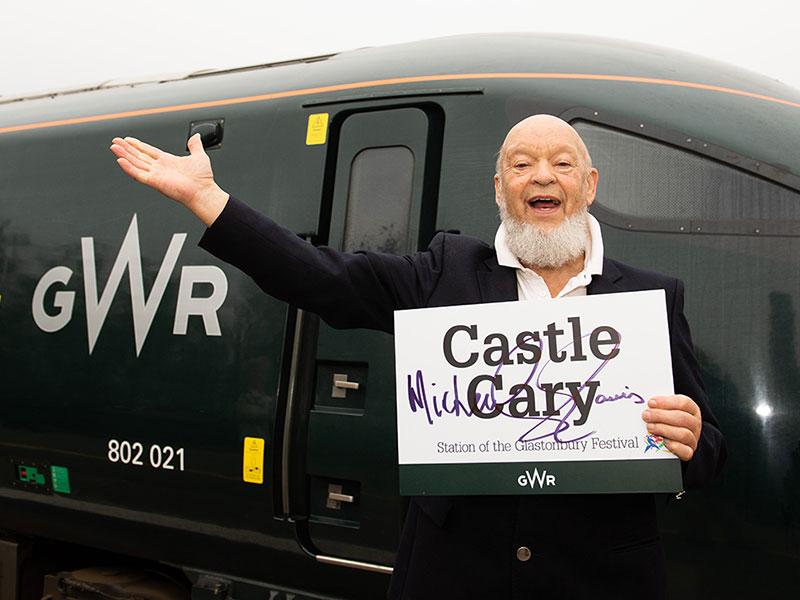
Eavis grew up at Worthy Farm and hosted the Pilton Pop Folk & Blues Festival in 1970 after being inspired by the performance of Led Zeppelin at the Bath Festival of Blues.
The following year a free festival, Glastonbury Fayre, again took place at Worthy Farm and this was to develop into the world-famous Glastonbury Festival.
After welcoming 1,500 people in 1970, the festival now hosts 250,000 festival goers each year – a slender proportion of the more than three million people who register annually for tickets.
In 2010, the festival’s 40th year, Eavis appeared on the main stage with headline artist Stevie Wonder to sing the chorus of Happy Birthday. In 2016, at the age of 80, he accompanied Coldplay on stage in a rendition of My Way.
Eavis was awarded a CBE for services to music in 2007 and, in 2009, was nominated by Time magazine as one of the top 100 most influential people in the world. He was awarded the Freedom of Glastonbury on 3 May, 2022.
- 802018 honours Devon community heroes Preston de Mendonça and Jeremy Doyle, who were named BBC Make a Difference Superstars for selflessly helping others at the height of the pandemic.
Family and friends joined them for a special train-naming ceremony at Exeter St Davids Station on 18 August 2021.
 Pictured: Preston de Mendonça
Pictured: Preston de Mendonça
Preston de Mendonça
Preston inspired those around him in Cornwood in the South Hams, promoting initiatives to build community cohesion, reduce isolation and support struggling families.
He helped to set up a group of volunteers to keep the village shop open when the owner had to shield during the lockdowns. It meant the shop survived and was key to food supplies for many in the village.
Preston also helped set up a Good Neighbour Group to make sure no-one fell through the gaps of lockdown if their usual support networks failed. It morphed into a dispersed, informal, rapid, community communication network, helping to bring villagers closer together.
South West Devon MP Gary Streeter said:
“Preston’s community spirit was an example to many and typified the way that our communities pulled together through unprecedented times. I am delighted that his selfless public service has been recognised by GWR.”
 Pictured: Jeremy Doyle
Pictured: Jeremy Doyle
Jeremy Doyle
At the peak of the pandemic Jeremy proved to be a community champion in Totnes, organising a support group to assist with shopping, carrying out a series of DIY jobs including showing neighbours how to make their own wooden benches, fixing a neighbour’s car, helping with IT issues and even feeding a young person’s rabbit.
But his biggest impact was arranging and playing in three socially-distanced concerts in his street, arranging for the concerts to go out live on Facebook for others to enjoy.
Totnes MP Anthony Mangnall said:
“I am very pleased that Jeremy’s selfless efforts during the pandemic have been recognised and that there will be a lasting reminder of his contribution to the community. This honour is very well deserved and reflects the gratitude of the residents of Totnes.” A lone piper led a poignant tribute as 802022 was named after one of Britain’s most influential railway figures, Cyril Bleasdale OBE.
Cyril’s widow, Katy, family, friends and a host of leading lights from the railway industry were present at London Paddington on 8 July 2025.
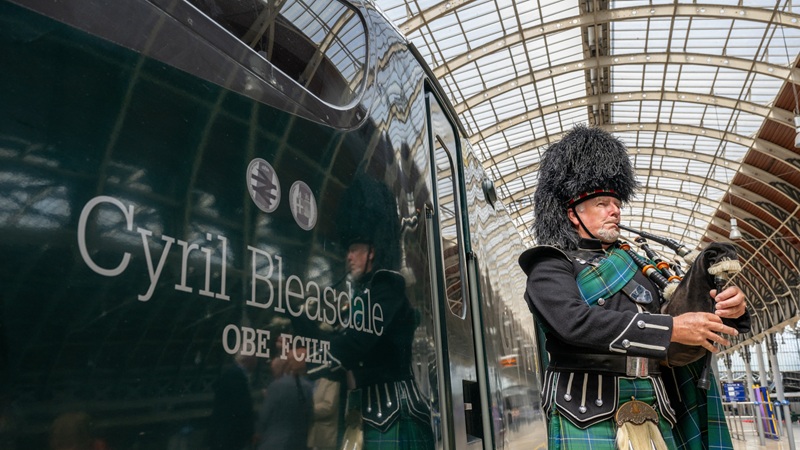
Cyril Bleasdale OBE
Cyril, who died in 2022 aged 87, dedicated his life to the railway, helping to shape the future of British Rail by launching its famed InterCity sector, and later becoming the first standalone head of ScotRail.
His naming recognised a lifetime of innovation, leadership, and unwavering commitment to the railway and came as the industry reflected on the past 200 years and looked forward to an exciting future as part of Railway 200 celebrations.
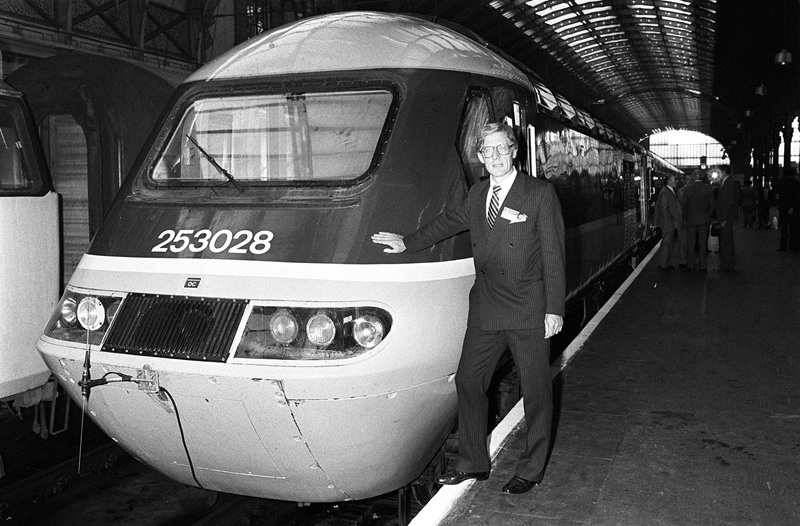
Great Western Railway Managing Director, Mark Hopwood CBE, said: "Cyril was a true railway pioneer. His vision helped modernise rail travel for millions and we were proud to honour his extraordinary contribution with this train naming."
Katy said: "Cyril would have been so proud to have this train named in his honour and I would like to thank GWR Managing Director Mark Hopwood and all those who have helped to make it happen."
With over 40 members of the Astor family present, Intercity Express Train number 802101 was named by Nancy’s granddaughter the Honourable Emily Astor on 28 November 2019.
Nancy Astor was the first woman to take her seat in the House of Commons after winning the Plymouth Sutton by-election, a seat previously held by her husband Waldorf.
In fact, Nancy was an American citizen, having come to England when she was 26 and marrying Waldorf Astor shortly afterwards.
Nancy faced massive prejudice entering the totally male dominated House of Commons chamber with 700+ MPs determined to freeze her out, including those in her own party. She famously clashed with Winston Churchill on many an occasion.
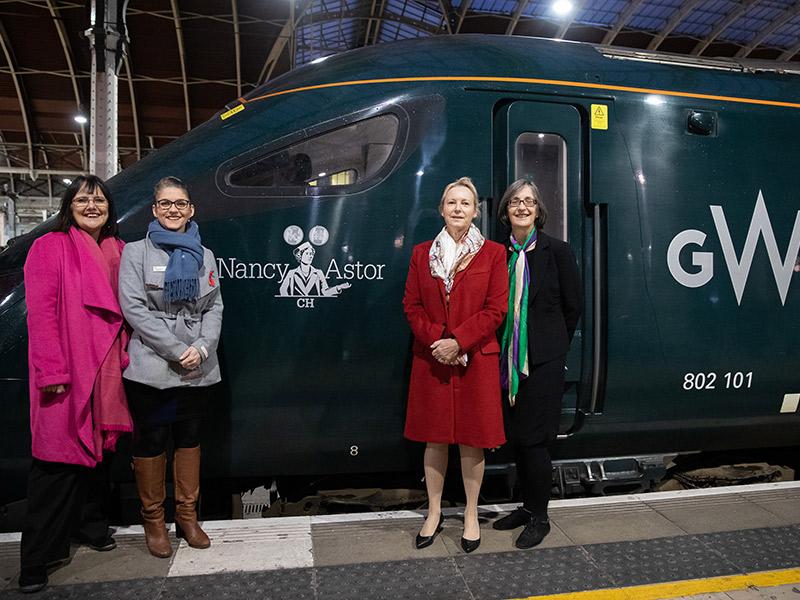 Pictured: Dr Jacqui Turner (Leading Astor Historian – Reading University), Ruth Busby (Human Resources Director – Great Western Railway), the Honourable Emily Astor (granddaughter of Nancy Astor), Dr Helen Pankhurst (great-granddaughter of Emmeline Pankhurst)
Pictured: Dr Jacqui Turner (Leading Astor Historian – Reading University), Ruth Busby (Human Resources Director – Great Western Railway), the Honourable Emily Astor (granddaughter of Nancy Astor), Dr Helen Pankhurst (great-granddaughter of Emmeline Pankhurst)
But she was not without controversy and with views, which are unacceptable today, but were very much commonplace in that interwar period. Her views were often exaggerated, embellished, and sometimes twisted by a hostile Parliament and press which could not accept a female presence in this kingdom of masculinity.
Without doubt Nancy did so much to further the cause woman in politics, but also the cause of those from all classes and statue, fighting against prejudice in a male dominated environment.
The Campaign Against Anti-Semitism takes a nuanced approach – celebrating Lady Astor as a “trailblazer for women in politics” but stressing her views towards Jewish communities needed to be remembered, saying: “Hopefully that will serve as a lesson that in our time we must not sacrifice our solidarity with a minority community for other priorities, however worthwhile.”
The cast of her iconic murder mystery play, The Mousetrap, were at Paignton station to see 802110 named after best-selling author Dame Agatha Christie. Christie’s grandson, Mathew Prichard, named the train during a special ceremony on 12 September 2023.
Watch GWR stage train-naming ceremony for best-selling author Agatha Christie.
Born in Torquay, Christie was a writer during the ‘Golden Age of Detective Fiction’, amassing 66 novels and 14 short-story collections, leading her to be dubbed the ‘Queen of Crime’.
Among them was The Mousetrap, the world’s longest-running play, which celebrated its 70th year in 2023 with a national tour.
The cast of The Mousetrap broke off from rehearsals at Torquay’s Princess Theatre to join guests at Paignton station. Also in attendance was 103-year-old Joan Nott, a world-renowned expert on all things Agatha Christie.

Torbay MP Kevin Foster said: “Agatha Christie’s legacy can be seen all over Torbay, with her stories still captivating audiences and readers worldwide. Given the role our railways played in her books and the special place Paignton was for her, it is apt Paignton station should be the location for this naming ceremony. Everywhere this train goes it will promote both her legacy and the English Riviera as a whole.”

